You are using an outdated browser. Upgrade your browser today or install Google Chrome Frame to better experience this site.


Heat Illnesses
Your chances of getting heat stroke, heat exhaustion, or other heat-related illness during travel depend on your destination, activities, level of hydration, and age. Learn ways to prevent, recognize, and treat heat-related illness .

Find a Clinic
Advice for Travelers
Personalized Health Information Tool for Global Travel
Disease Directory
Frequently Asked Questions
CDC Yellow Book
Pre-travel Rapid Evaluation Portal for Patients
Clinician Resources
Research and Surveillance
- Medical Tourism
- Cholera Information for Health Care Professionals
- COVID-19 Travel Information
- Travel Industry Resources

Learn about CDC’s Traveler Genomic Surveillance Program that detects new COVID-19 variants entering the country.

Sign up to get travel notices, clinical updates, & healthy travel tips.
See the full list of Travel Health Notices , including:
Level 2 - Practice Enhanced Precautions
- Mpox in the Democratic Republic of the Congo June 10, 2024
- Chikungunya in Maldives May 28, 2024
- Global Polio May 23, 2024
Level 1 - Practice Usual Precautions
- Updated Oropouche Fever in the Americas June 27, 2024
- Global Dengue June 25, 2024
- Salmonella Newport in Mexico May 30, 2024
There are no Warning , Alert, Watch, COVID-19 Very High, COVID-19 High, COVID-19 Moderate, COVID-19 Low, COVID-19 Unknown, Level 4, or Level 3 notices currently in effect.
File Formats Help:
- Adobe PDF file
- Microsoft PowerPoint file
- Microsoft Word file
- Microsoft Excel file
- Audio/Video file
- Apple Quicktime file
- RealPlayer file
- Zip Archive file
Exit Notification / Disclaimer Policy
- The Centers for Disease Control and Prevention (CDC) cannot attest to the accuracy of a non-federal website.
- Linking to a non-federal website does not constitute an endorsement by CDC or any of its employees of the sponsors or the information and products presented on the website.
- You will be subject to the destination website's privacy policy when you follow the link.
- CDC is not responsible for Section 508 compliance (accessibility) on other federal or private website.
Security Alert May 17, 2024
Worldwide caution.
- Travel Advisories |
- Contact Us |
- MyTravelGov |
Find U.S. Embassies & Consulates
Travel.state.gov, congressional liaison, special issuance agency, u.s. passports, international travel, intercountry adoption, international parental child abduction, records and authentications, popular links, travel advisories, mytravelgov, stay connected, legal resources, legal information, info for u.s. law enforcement, replace or certify documents.
Share this page:
China Travel Advisory
Travel advisory april 12, 2024, mainland china, hong kong & macau - see summaries.
Updated due to new national security legislation in the Hong Kong Special Administrative Region.
Summary: Reconsider travel to Mainland China due to the arbitrary enforcement of local laws, including in relation to exit bans, and the risk of wrongful detentions.
Exercise increased caution when traveling to the Hong Kong Special Administrative Region (SAR) due to the arbitrary enforcement of local laws .
Reconsider travel to the Macau Special Administrative Region (SAR) due to a limited ability to provide emergency consular services . Exercise increased caution when traveling to the Macau SAR due to the arbitrary enforcement of local laws .
See specific risks and conditions in each jurisdiction .
Mainland China – Level 3: Reconsider Travel
Reconsider travel due to the arbitrary enforcement of local laws , including in relation to exit bans, and the risk of wrongful detentions .
Summary: The People’s Republic of China (PRC) government arbitrarily enforces local laws, including issuing exit bans on U.S. citizens and citizens of other countries, without fair and transparent process under the law.
The Department of State has determined the risk of wrongful detention of U.S. nationals by the PRC government exists in the PRC.
U.S. citizens traveling or residing in the PRC may be detained without access to U.S. consular services or information about their alleged crime. U.S. citizens in the PRC may be subjected to interrogations and detention without fair and transparent treatment under the law.
Foreigners in the PRC, including but not limited to businesspeople, former foreign-government personnel, academics, relatives of PRC citizens involved in legal disputes, and journalists have been interrogated and detained by PRC officials for alleged violations of PRC national security laws. The PRC has also interrogated, detained, and expelled U.S. citizens living and working in the PRC.
PRC authorities appear to have broad discretion to deem a wide range of documents, data, statistics, or materials as state secrets and to detain and prosecute foreign nationals for alleged espionage. There is increased official scrutiny of U.S. and third-country firms, such as professional service and due diligence companies, operating in the PRC. Security personnel could detain U.S. citizens or subject them to prosecution for conducting research or accessing publicly available material inside the PRC.
Security personnel could detain and/or deport U.S. citizens for sending private electronic messages critical of the PRC, Hong Kong SAR, or Macau SAR governments.
In addition, the PRC government has used restrictions on travel or departure from the PRC, or so-called exit bans, to:
- compel individuals to participate in PRC government investigations;
- pressure family members of the restricted individual to return to the PRC from abroad;
- resolve civil disputes in favor of PRC citizens; and
- gain bargaining leverage over foreign governments.
U.S. citizens might only become aware of an exit ban when they attempt to depart the PRC, and there may be no available legal process to contest an exit ban in a court of law. Relatives, including minor children, of those under investigation in the PRC may become subject to an exit ban.
The PRC government does not recognize dual nationality. Dual U.S.-PRC citizens and U.S. citizens of Chinese descent may be subject to additional scrutiny and harassment. If you are a U.S. citizen and choose to enter Mainland China on travel documents other than a U.S. passport and are detained or arrested, the PRC government may not notify the U.S. Embassy or the U.S. Consulates General or allow consular access.
Check with the PRC Embassy in the United States for the most updated information on travel to the PRC. In some limited circumstances travelers to Mainland China may face additional COVID-19 testing requirements to enter some facilities or events.
The Department of State does not provide or coordinate direct medical care to private U.S. citizens abroad. U.S. citizens overseas may receive PRC-approved COVID-19 vaccine doses where they are eligible.
Do not consume drugs in the PRC or prior to arriving in the PRC. A positive drug test, even if the drug was legal elsewhere, can lead to immediate detention, fines, deportation, and/or a ban from re-entering the PRC. PRC authorities may compel cooperation with blood, urine, or hair testing. Penalties for drug offense may exceed penalties imposed in the United States.
Demonstrations : Participating in demonstrations or any other activities that authorities interpret as constituting an act of secession, subversion, terrorism, or collusion with a foreign country could result in criminal charges. Be aware of your surroundings and avoid demonstrations.
XINJIANG UYGHUR AUTONOMOUS REGION, TIBET AUTONOMOUS REGION, and TIBETAN AUTONOMOUS PREFECTURES
Extra security measures, such as security checks and increased levels of police presence and surveillance, are common in the Xinjiang Uyghur Autonomous Region, Tibet Autonomous Region, and Tibetan Autonomous Prefectures. Authorities may impose curfews and travel restrictions on short notice.
If you decide to travel to Mainland China:
- Enter the PRC on your U.S. passport with a valid PRC visa and keep it with you.
- Read the travel information page for Mainland China .
- Enroll in the Smart Traveler Enrollment Program (STEP) to receive alerts and make it easier to locate you in an emergency.
- Avoid demonstrations.
- Exercise caution in the vicinity of large gatherings or protests.
- Avoid taking photographs of protesters or police without permission.
- Keep a low profile.
- If you are arrested or detained, ask police or prison officials to notify U.S. Embassy Beijing or the nearest U.S. Consulate General immediately.
- Review the China Country Security Report from the Overseas Security Advisory Council.
- Do not consume drugs in the PRC or prior to arriving in the PRC.
- Follow the Department of State on Facebook and Twitter . Follow U.S. Embassy Beijing on Twitter , WeChat , and Weibo .
- Visit the Centers for Disease Control and Prevention (CDC) page for the latest Travel Health Information related to the PRC.
- Prepare a contingency plan for emergency situations.
- Review the Traveler’s Checklist .
Hong Kong Special Administrative Region (SAR) – Level 2: Exercise Increased Caution
Exercise increased caution due to the arbitrary enforcement of local laws .
Summary: Hong Kong SAR authorities have dramatically restricted civil liberties since the Government of the People’s Republic of China (PRC) imposed the Law of the PRC on Safeguarding National Security in the Hong Kong SAR on June 30, 2020. Following the Hong Kong SAR government’s enactment of its own Safeguarding National Security Ordinance on March 23, 2024, Hong Kong SAR authorities are expected to take additional actions to further restrict civil liberties.
The 2020 National Security Law outlines a broad range of vaguely defined offenses, such as acts of secession, subversion, terrorism, and collusion with foreign entities. The 2024 Safeguarding National Security Ordinance builds on this framework with additional vaguely defined offenses, such as treason, insurrection, theft of state secrets, sabotage against public infrastructure, and external interference. According to the legislation, these offenses are applicable to foreign nationals within the Hong Kong SAR and to individuals, including U.S. citizens and permanent residents, located outside its borders. Under these provisions, anyone who criticizes the PRC and/or Hong Kong SAR authorities may face arrest, detention, expulsion, and/or prosecution. Hong Kong SAR authorities are attempting to enforce these provisions against individuals, including U.S. citizens and permanent residents, residing outside of their jurisdiction by offering cash rewards for information leading to their arrests in the Hong Kong SAR.
Dual Nationality: The Hong Kong SAR government does not recognize dual nationality. Dual U.S.-PRC citizens and U.S. citizens of Chinese descent may be subject to additional scrutiny and harassment. If you are a dual U.S.-PRC citizen and enter Hong Kong SAR on a U.S. passport, and you are detained or arrested, PRC authorities are under an obligation to notify the U.S. Embassy or a U.S. Consulate General of your detention and to allow U.S. consular officials to have access to you. In practice, however, U.S. consular officers may be prevented from providing consular assistance, even to those who have entered on their U.S. passports. For more information, visit Consular Protection and Right of Abode in HK(SAR) for Dual Nationals - U.S. Consulate General Hong Kong & Macau .
Demonstrations : Participating in demonstrations or any other activities that authorities interpret as constituting an act of secession, subversion, terrorism, or collusion with a foreign country could result in criminal charges under the 2020 National Security Law and/or the 2024 Safeguarding National Security Ordinance. Be aware of your surroundings and avoid demonstrations.
If you decide to travel to the Hong Kong SAR:
- Enter the Hong Kong SAR on your U.S. passport and keep it with you.
- Read the travel information page for the Hong Kong SAR .
- Be aware of your surroundings.
- If you are arrested or detained, ask police or prison officials to notify U.S. Consulate General Hong Kong & Macau immediately.
- Review the China Country Security Report from the Overseas Security Advisory Council.
- Do not consume drugs in the Hong Kong SAR or prior to arriving in the Hong Kong SAR.
- Follow the Department of State on Facebook and Twitter . Follow U.S. Consulate General Hong Kong & Macau on Facebook and Twitter .
- Visit the Centers for Disease Control and Prevention (CDC) page for the latest Travel Health Information related to the Hong Kong SAR.
- Monitor local media, local transportations sites, and apps like MTR Mobile or Citybus for updates.
Macau Special Administrative Region (SAR) – Level 3: Reconsider Travel
Reconsider travel due to a limited ability to provide emergency consular services. Exercise increased caution due to the arbitrary enforcement of local laws.
Summary: The U.S. government has a limited ability to provide emergency services to U.S. citizens in the Macau SAR due to People’s Republic of China (PRC) Ministry of Foreign Affairs travel restrictions on U.S. diplomatic personnel.
Even in an emergency, the PRC Ministry of Foreign Affairs requires all U.S. diplomatic personnel, including those accredited to the Macau SAR, to apply for and receive visas before entering the Macau SAR. Approval takes at least five to seven days, significantly limiting the U.S. government’s ability to offer timely consular services in the Macau SAR.
Dual Nationality: The Macau SAR government does not recognize dual nationality. Dual U.S.-PRC citizens and U.S. citizens of Chinese descent may be subject to additional scrutiny and harassment. If you are a dual U.S.-PRC citizen and enter the Macau SAR on a U.S. passport, and you are detained or arrested, PRC authorities are under an obligation to notify the U.S. Embassy or a U.S. Consulate General of your detention and to allow U.S. consular officials to have access to you. In practice, however, U.S. consular officers may be prevented from providing consular assistance, even to those who have entered on their U.S. passports. For more information, visit Consular Protection and Right of Abode in HK(SAR) for Dual Nationals - U.S. Consulate General Hong Kong & Macau .
Demonstrations : Participating in demonstrations or any other activities that authorities interpret as constituting an act of secession, subversion, terrorism, or collusion with a foreign country could result in criminal charges. Be aware of your surroundings and avoid demonstrations.
If you decide to travel to the Macau SAR:
- Enter the Macau SAR on your U.S. passport and keep it with you.
- Read the travel information page for the Macau SAR .
- If you are arrested or detained, ask police or prison officials to notify Review the China Country Security Report from the Overseas Security Advisory Council.
- Do not consume drugs in the Macau SAR or prior to arriving in the Macau SAR.
- Follow the Department of State on Facebook and Twitter . Follow U.S. Consulate General Hong Kong & Macau on Facebook and Twitter .
- Visit the Centers for Disease Control and Prevention (CDC) page for the latest Travel Health Information related to the Macau SAR.
- Monitor local media and the Macau Government Tourism Office website for updates.
- Review your flight status with your airline or at the Macau International Airport website.
Travel Advisory Levels
Assistance for u.s. citizens, search for travel advisories, external link.
You are about to leave travel.state.gov for an external website that is not maintained by the U.S. Department of State.
Links to external websites are provided as a convenience and should not be construed as an endorsement by the U.S. Department of State of the views or products contained therein. If you wish to remain on travel.state.gov, click the "cancel" message.
You are about to visit:
Required and Recommended Vaccinations for China Travel
:max_bytes(150000):strip_icc():format(webp)/EBC_pose-591232dc5f9b586470fb3268.jpg)
Obviously, if you're just traveling to China , it's a different story than if you're moving to China. So read this article with that in mind. When traveling to China, your physician will help you understand the risks and you can decide what kind of vaccinations you might decide you'd like to have, based on this advice.
If your plan involves moving to China or a longer stay, say over three months, than the situation is slightly different and you will want to take this into account. Some areas are at higher risk for certain diseases than other areas. So you'll want to find out about the specifics of where you will be going before you begin discussing what you need with your doctor.
Required Vaccinations
For visitors and tourists to China, there are no required vaccines. This means that by law, there are no vaccinations that you must get before you visit. However, physicians and the Center for Disease Control do advise to make sure that all travelers are up to date on their routine immunizations.
Routine Immunizations
The following vaccines are recommended to be current before traveling to China:
- Tetanus-diphtheria (DPT)
- Measles/Mumps/Rubella (MMR)
- Varicella (chickenpox)
- Hepatitis A is recommended for all travelers over 12 months of age to China.
- Typhoid is recommended especially if you’ll be in rural areas where you may eat or drink outside large restaurants and hotels where you may come into contact with contaminated water or food.
Possible Immunizations That You May Need
Your physician might have you consider the following vaccines if your stay in China is longer than a short two-week visit.
- Yellow fever is required by Chinese law only if you are arriving from an infected area such as Africa.
- Japanese encephalitis is recommended for longer-term travelers, especially children, who are susceptible to mosquito bites and will be outdoors during mosquito season (which can last from May to November in southern China).
- Hepatitis B is also recommended for longer-term visitors/residents as it is very common throughout China.
- Rabies is recommended for any traveler who may come in contact with or handle animals, especially dogs. Rabies is common in China while the vaccination is not.
The vaccination information is a collection of information that can be found on the Center for Disease Control and MD Travel Health specifically for China.
Staying Healthy While Traveling
While vaccines can help prevent your contracting serious diseases, they are not going to block against all germs you will come across in a new country. And since you'll be exposed to things you aren't used to, you'll need to be careful.
You should certainly be careful when it comes to drinking water. Make sure you drink only bottled or boiled water. Even when brushing teeth, don't forget to use the free bottled water that all hotels in China supply. And if there's not enough, it is perfectly acceptable to ask for more from housekeeping or reception.
It's also important not to push yourselves and your family too hard when it comes to the agenda for sightseeing, especially when you have small children along or when you are traveling in the summer months. Jet lag can be tough but if you're not rested, then you won't enjoy your trip very much. If you're up early, get out and do things but then head back to the hotel for a nap to let everyone catch up on sleep.
It is very helpful to have a small first-aid travel kit along so that you have some basics with you and won't need to go navigating pharmacies or drug-stores in a foreign land.
And finally, a last word of advice is to wash your hands often! This is your first defense, and often your best. You'll be touching and holding things covered with germs you're not used to. Bring along hand sanitizer and wipes and keep your hands clean to keep healthy.
Recommended Vaccines and Immunizations for Peru Travel
What to Pack in Your First Aid Kit for China
Is It Safe in Tanzania?
Is It Safe to Go On a Hike Right Now?
Kenya Travel: Visas, Health, Transport, & More
Tunisia Travel: Visas, Health, Transport, & More
Guatemala Vaccinations and Health Information
Essential Info for First-Time Visitors to the Philippines
How to Stay Safe on a Trip to the Dominican Republic
Traveling in China During Chinese New Year
The CDC Just Eased COVID-19 Travel Recommendations for 61 Countries
The CDC "Strongly" Recommends That You Don't Travel for Thanksgiving
Everything International Travelers Need to Know About Planning a Trip to the US
What Travelers Should Know About the Delta Variant
Everything to Know About Hiking With Your Dog
Nigeria Travel Guide: Essential Facts and Information
We’re sorry, this site is currently experiencing technical difficulties. Please try again in a few moments. Exception: request blocked
- About the Embassy
- Consular Services
- Embassy News
- China-Tonga
I. Pre-boarding Nucleic Acid Test
All China-bound travelers will need to take nucleic acid test for COVID-19 within 48 hours before boarding, and can only travel to China when your test result is negative or after it turns from positive to negative. Please always bring the proof of your negative COVID-19 test result with you for inspection.
ll. Health Declaration to China Customs
You are required to declare your negative test result to China Customs by filling the Health Declaration Form on the WeChat mini - program of China Customs (scan the QR code below), or at https://htdecl.chinaport.gov.cn , or via the China Customs APP.

Ill. Boarding Check
At boarding time, airlines will check if you have a negative result within 48 hours, and those who fail to present such a proof will not be allowed to board the plane.
IV. Self-protection on the Aircraft
You are suggested to wear a mask throughout the flight and take good personal protection to reduce the risk of infection.
V. Inspection upon Entry
You can go through customs with your health declaration result, and China Customs may check your proof of negative COVID-19 test result.
If you pass the health declaration and entry inspection, no further requirements will be imposed.
If there are anomalies in your health declaration or you are showing symptoms such as fever, you are required to take an antigen test by China Customs.Those whose results are positive will need to self-quarantine or seek medical treatment as notified by the authority. Those whose results are negative will go through routine quarantine inspection by China Customs in accordance with the Frontier Health and Quarantine Law and other laws and regulations.
VI. After-entry Epidemic Prevention and Control
After entry into China, you will have to strictly abide by the epidemic prevention and control requirements of the place where you stay.
Requirements for Proof of COVID-19 Test
I. The proof must have the name of the traveler, which should be exactly the same as it appears on the travel document used for the flight. It is recommended that the date of birth and travel document number also be shown on the proof
II. The proof must also have:
Time of the test or time of issue(at least one of them should be within 48 hours before boarding);testing method (which should be nucleic acid testing; antigen testing will not be accepted); test result(which should be negative; 'uncertain’ will not be accepted); and name and contact details of the testing institution.
III. The proof must be in the official language of the place of departure of your flight to China, or in English. It will be checked by the airline of your flight to China.
IV. It should be a hard copy. If the testing institution issued a digital copy, please print it out and take it with you.

TRAVEL to CHINA – Tips and Information Guide for 2024
Everything you need to know about planning travel to China in our comprehensive destination guide.
From hiking the Great Wall of China to conquering your fear of heights at the highest glass bridge in the world, these are just some of the reasons why you should travel to China.
China is one of the most amazing countries in the world that is deservedly on nearly every traveller’s bucket list.
There aren’t that many countries that possess such various geographical climates, rich biodiversity, stunning landscapes and culture that persisted as the result of over 4,000 years of accumulated historical heritage.
Whether you want to roam its markets or its mountains and jungles, China has something to offer for everyone.
This country boasts in the diversity in its cuisine in addition to that of its languages, people, climate regions and biodiversity.
When you visit China you will be thoroughly amazed that the diet and culinary options vary from region to region.
This in itself gives you more than enough reason to visit China from one end to the other.
So if you’re planning your trip to China and you want your trip to be packed with experiences, new sights, and exotic cuisine while being vastly different from any other previous trip you’ve taken, then our China travel guide should make the planning as fun as the travel experience itself!
China Travel Guide
Before heading towards China, check out some basic information you might need:
General Information
- Capital: Beijing
- Other Main Cities: Shanghai, Guangzhou, Urumqi, Shenzen, Chengdu, Xian
- Currency: Renminbi
- Language: Standard Chinese, Mongolian, Uyghur, Tibetan and Zhuang
- Population: 1,403,500,365
- Area: 9,596,961 sq.m2
- Electricity Voltage: 220V
- Electricity Sockets: Type A, C and I

Top 5 Places to Visit in China
- Mount Huangshan – the UNESCO World Heritage is one of the most scenic highlights in the world. The impressive landscape features daunting peaks, thick forests composed of oddly-shaped pine trees and dense clouds covering the sky. It’s a perfect weekend trip if you want to see the most notable peaks and viewpoints of the Yellow Mountains .
- Suzhou – another UNESCO World Heritage site, a town nicknamed the ‘Venice of the East.’ If you’re visiting Shanghai, don’t miss the opportunity to pay a visit to this water town. The canals, gardens, narrow alleyways, picturesque pagodas and bridges make it a perfect day trip for some relaxation time.
- Hangzhou – one of the seven ancient capitals of China and one of its Four Garden Cities. It’s known for the West Lake and stunning and well-preserved nature. The lake area consists of about 60+ cultural sites and spots to enjoy its nature . You can book a guided cruise tour that combines the best of natural sites but also incorporates this city’s rich history.
- Guilin – this site has well-deserved its reputation for being one of the biggest natural gems in the world. The oddly-shaped hills (Karst Mountains), mysterious caves and its riverside decorated with the tall bamboo trees, paints a scenery unique to China.
- Beijing – C hina’s capital that is home to over 21 million people is not only the political center of the country but also has other impressive cultural and historical highlights that are not to be missed! Those include one of the World’s most recognizable landmark, the Great Wall of China and, equally as fascinating Forbidden City – today, a declared UNESCO World Heritage which was home to the rulers of the famous Ming and Qing dynasties.
Top 5 Travel Experiences in China
- Hiking the Great Wall of China – There are many sections of the wall that you can hike. We recommend the Jinshanling section, as most agrees it not only has the most beautiful scenery but is also the most accessible. The Chinese government has invested a lot into the infrastructure of this section, vastly improving the paths, cableway, roads and adding new hiking routes and even, organizing a shuttle bus. You can even camp on the Great Wall of China if you want!
- Walk Over the Zhangjiajie Glass Bridge – This is the longest and highest glass bridge in the World. It will be not only a memorable but also an adrenaline-inducing experience. This area is incredibly special, especially because of the Avatar Mountains and all the beautiful nature in this national park.
- Visit the Panda Reserve in Chengdu – if you’re an animal lover then you won’t regret taking the time to explore the reserve. The Chinese consider pandas sacred animals, and they are doing everything they can to ensure that we will be able to remove pandas from the endangered animals’ list. This gorgeous reserve is a testament to their dedication . Check out our post on how to spend 3 days in Chengdu .
- Mogao Caves , Dunhuang – More popularly known as the Caves of a Thousand Buddhas, these are a series of caves (492 caves) where ancient Buddhist carvings, manuscripts and murals from the 14th century can be found. This place is well worth the time, energy and money you’d need to see it. The world-class experts will guide you through over 41,800 meters of Buddhist history.
- Visit the Forbidden City – This UNESCO World Heritage Site in Beijing is incredibly important for the history and culture of the Chinese people. It is a wonderful example of traditional Chinese architecture, it’s home to the famous Palace Museum and it is the largest ancient palatial structure in the whole world!
Best Time To Visit China
When considering when to plan your trip to China one of the most important things to keep in mind are the season and the weather.
Some people plan their trips around certain events. While others plan around the seasons/weather.
When NOT to Visit China
When organizing your trip to China, a good starting point is to first decide when NOT to go!
A good rule of thumb is to avoid every public Chinese holiday ! But that might prove a little bit trickier than you’d expect since some follow the lunar calendar and are different year to year.
And it sounds counterintuitive to avoid China at certain times. But during public holidays China turns into an entirely different country for a traveller.
This is because transportation tickets are more expensive. Booking a train ticket will prove to be almost an impossible feat and all tourist sites will be overcrowded.
Not to mention that a lot of places will be closed for a couple of days or even a week. So you might miss an opportunity to visit locals’ favorite small eateries or some traditional venues.
So for visitors who really want to take their time and enjoy China’s main highlights, this would definitely be the worst time to visit.
Avoid the Spring Festival (more known as Chinese New Year/ Chunjie) – mid to late January to mid-February.
This is the most important holiday and you can expect to see millions of Chinese traveling all over the country.
It’s known to be the biggest annual mass migration in the world.
You should also avoid visiting China during the Golden Week or the week of National Day.
It’s from the 1st – 7th of October. And while the number of people that participate is lower than during the Spring Festival, there are still a lot of people moving and a lot of places closed to the public.
A lot of Chinese travelers also go abroad during this time so you can expect ticket prices for Japan and Thailand to go up.
If you want to visit during those dates, then just make sure to book well in advance and keep in mind that you will be paying more for everything – from accommodation to street food.
Other popular events are the Lantern Festival and the Dragon Boat Festival .
Those events should not interfere with your travel but expect slightly larger crowds at certain sites.
When to Visit China
So now that we tackled when NOT to visit China, what is the best time to visit China?
China occupies a landmass with various climates spanning all over the country.
The best times for a visit are generally in spring (March-May) and autumn (September–November).
If you’re having trouble deciding when to visit, a useful trick is to also divide China by regions and seasons.
As we said, spring is a great time to travel pretty much all over China.
But in the north, it might be colder during early spring or late fall. But the weather should still be manageable.
The exception is Tibet . This is because it is closed to foreign visitors for two months every spring.
From April to June, you can visit just about anywhere.
The best times to visit some places in northern China, Hainan or Tiber are during mid-summer.
Some destinations are almost unbearably hot during summer and if you are sensitive to high temperatures, you should keep that in mind.
The places that we would avoid during the summer are:
- Nanjing (Jiangsu)
- Wuhan (Hubei)
- Chongqing (Sichuan)
- Inner Mongolia
Other Travels Seasons
The factor that you should include when planning when to visit is the rainy season.
From April to August if you’re planning to visit southern China, your flight just might be delayed or even cancelled due to bad weather conditions.
At this time of year, it’s best to travel via high-speed trains – they’re rarely delays, fast and comfortable.
As with many other places in the world, in July and August students are on a school break and many families use that time to go on a summer vacation.
Prices will be higher in summer and you should plan well in advance.
Autumn is ideal if you want to visit spots that otherwise experience unbearably high temperatures in summer.
We would suggest during autumn that you plan to visit the Great Wall, Hong Kong and Xinjiang.
To see the incredible feat of mankind, the Great Wall, surrounded and bathed in autumn colours, is a visual experience like no other.
If you’re thinking to book your trip during your winter holidays you will be rewarded with fewer crowds and cheaper prices if you can withstand the cold.
During winter you can visit the Harbin Ice Festival (24th of December to 25th of February).
The snow and the scale of ice sculptures that are illuminated at night are an amazing sight to see.
The necessity of warm clothing can never be overemphasized as the temperatures drop during night low as -24 °C and are hardly ever over zero during the day.
A less known fact is that Tibet is great for winter traveling.
During the high season, there is a limited time how much you can spend at the Potala Palace . But you can spend as long as you wish during winter.
The capital of Tibet, Lhasa, also has warmer winters than Beijing.
If that’s not a good enough reason to travel to Tibet during winter, we will also mention that it’s definitely a more economical option and permits to enter the region are easier to get.
You will get a more authentic experience during winter because that’s also when many pilgrims arrive in Tibet.
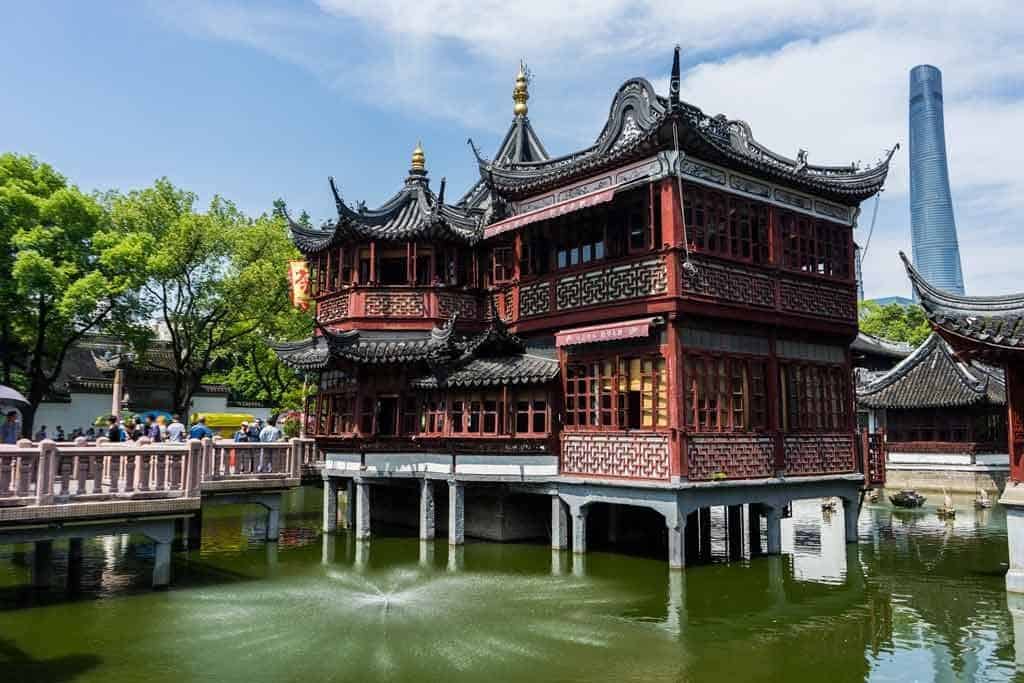
Food In China
- Beijing Duck – This dish is a must when you’re in Beijing, the birthplace of this iconic dish. The sweet and savory duck is served with spring onions, cucumbers, pancakes and other different sides (every restaurant has its own spin on this Chinese classic).
- Hot Pot – This can be an amazing choice or an utter disaster if you do not understand the Chinese spices and ingredients. It’s a pick your own destiny. First, choose the soup for your pot. This dish is all about the spice, but if your counterpart can’t handle the spice as well as you, you can split the pot into two. After choosing from a wide array of vegetables and meats you walk over to the sauce bar. The sauce bar offers barbecue sauce, freshly cut herbs, sesames and pastes, meats and vinegar. Ask a local to guide you through the process and help with their suggestions.
- Hong Shao Rou – This means red braised pork belly. It’s a dish that originated in Shanghai and is popular all across China. It’s cooked with garlic, chilli peppers, rice wine, ginger, soy sauce, sugar and deeply aromatic spices.
- Dumplings – These can be eaten at any time of the day. They are usually dipped in soy sauce or vinegar with garlic. Dumplings are a staple of Chinese cuisine and there are many variations to cater to all tastes. The dumpling dough can be based on potatoes, flour or bread and the filling can be made from almost anything – various meats, fish, vegetables or cheese.
- Chow Mein – This is a dish made popular by the locals of Northern China, which today has reached global fame. It’s a dish made out of thin noodles (bean and cornflour dough) and is accompanied by sliced meats, Chinese vegetables and an egg.
Travel Itineraries Suggestions for China
China is vast. As the 3rd largest country in the world, China has much to offer by way of travel experience.
But trying to see the entire country can be daunting.
Here is a suggested 12-day itinerary to give you the best chance to see the highlights in the least amount of time we’d recommend when you visit China.
Beijing (3-4 Days)
Perhaps the biggest reason why people go to China is to see the Great Wall of China.
Our main piece of advice is to skip the Badaling , which is the busiest section of the wall.
Visit a part of the wall that is unrestored but still tourist-friendly, such as Jinshanling, Huanghuacheng or Gubeikou .
The easiest section to visit would be to take a bus to Mutianyu .
There you won’t have the wall to yourself. But you will have successfully avoided most of the crowds and will see beautiful views.
The second day, go and roam Beijing’s hutongs.
These are a network of alleyways and courtyard houses that make up Beijing.
There are day tours that usually include the Wudaoying Hutong , Houhai Lake, the Lama Temple and the Bell and Drum Towers .
B ut if you have the time, the best way is to simply let yourself get lost.
If you have a budget set aside for activities, hutong tours are interesting as you’d get to learn more about history and culture.
On your third day, make sure to go and see the Tiananmen Square that carries a portrait of Mao right over the entrance to the Forbidden City.
The Forbidden City is huge and you could spend a full day there.
But for most travellers, even two hours is enough to see all the highlights before starting to feel overwhelmed.
For the rest of the day, go to Jingshan Park and enjoy the views of Beijing and the Forbidden City!
Xi’an (2 Days)
Rent a bike at one of the main gates of the wall and do a round trip tour around the ancient wall.
When you get off the wall, take some time to explore the art district near the South Gate .
The area is brimming with small shops and souvenirs.
This stunning neighborhood is a joy to photograph.
Take one afternoon to go roaming around the Huimin Jie Muslim market.
From bargaining for interesting souvenirs to bring back to your loved ones to eating some of the most delicious and cheapest street food you’ll ever have.
Also, you are only a day trip away from Xi’an are the terracotta warriors.
You can see rows upon rows of life-sized terracotta warriors.
Jiuzhaigou and Huanglong (2 Days)
Hiking through Jiuzhaigou is one of the most beautiful trails you’ll encounter. It is full of crystal lakes and rivers that will mesmerise you.
The waters are so crystal clear that they reflect the sky.
The next day visit Huanglong , known for its calcite deposit pools.
These vibrantly colored pools are why Chinese have nicknamed the Huanglong – “fairyland.”
Songpan (1 Day)
If you’re a fan of horses then definitely don’t miss out on a horse trek across the Tibetan plateau.
You will be able to travel with a local guide that will show you parts of China that most visitors don’t get to see.
Chengdu (2 days)
A bus ride to Chengdu is four to six hours (there are flight options available too). This will leave you just enough time in the afternoon to explore teahouses and the city’s scenic gardens.
For dinner, you should go and get the traditional eating experience – the hot pot (from Chongqing and Sichuan).
The next day you might want to take the two-hour trip to see the largest Buddha in the world.
There are many tourist buses that operate on a daily basis.
One of the highlights of Chengdu is their Panda Reserve .
Morning visits are the best because that’s when the pandas are most active.
They also have a baby area, where you can observe cubs play with toys and roll around.
Shanghai (2-3 days)
To visit Shanghai, try to have at least two full days available to give this city justice.
Some of Shanghai’s highlights are: the Bund, the Yu Yuan Gardens , the French Concession and Jing’an Temple .
A lot of visitors claim that the best soup dumpling eatery is outside the Yu Yuan Gardens. Just follow the queue.
To see the ever-rising skyscrapers expand before you in every direction you look, just go up to one of Shanghai’s buildings.
The usual go-to observatory spots are the Shanghai World Financial Center and the Jin Mao Tower .
Visa Requirements For China
If you are travelling to China you will have to apply for a visa from the Chinese embassy or their consulate.
This is unless you are a citizen from one of the visa-exempt countries.
An important side note : Hong Kong and Macau, have their own independent border control policy.
This means that they have their own visa requirements for which you have to apply separately from your Chinese visa.
There are only seventeen countries that are allowed to travel without a previously issued visa to China.
The countries that are exempt from visa are :
Stay up to 90 days:
- Bosnia and Herzegovina
Stay up to 60 days:
Stay up to 30 days
- Seychelles
- United Arab Emirates
Stay up to 15 days:
For further information and up-to-date changes, click here .
READ MORE: Our experience with getting a Chinese visa in Vietnam .
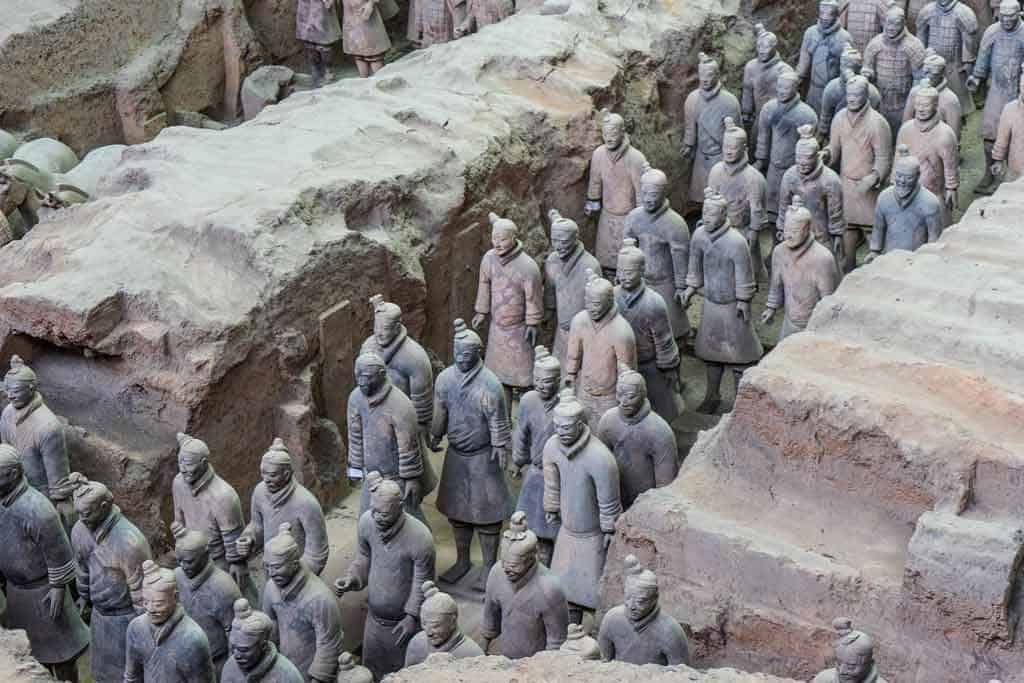
How to Travel to China
There are plenty of ways to travel to China. Whether you prefer to travel by air, land or sea you will find many options and rates for your travel into the country.
Flying is the fastest and most convenient way to travel from most countries in the world to China.
China air transport hubs are:
The biggest and most used airlines are:
- China Eastern Airlines
- China Southern Airlines
- Hainan Airlines
International flights connect China with major cities all around the world. Further, Chinese domestic flights connect all major cities within the country.
The only two cities in China that have two airports are Shanghai (Hongqiao International Airport and Pudong International Airport) and Beijing (Nanyuan Airport and Capital International Airport).
So be mindful of that when booking your flight.
There are eighteen cities in China that offer 72-hour visa-free transit so visitors can have a short stay in the most popular cities. Just note that these also tend to be the most expensive ones too.
From Europe:
Getting to China from Europe could be tricky and it most likely requires transfers.
That being said, you can still get to China from many European cities, such as Amsterdam, Milan, Rome, Brussels, Paris, Frankfurt, Manchester, Madrid, London, Zurich, Barcelona and Helsinki.
From the US:
It is possible to catch a direct flight from the US to China.
Most flights originate in San Francisco, Seattle, Detroit, Los Angeles, Seattle or Chicago and terminate in either Beijing or Shanghai.
Of course, pricing and availability vary. And you can expect the flights to be operated by one of the three big companies: Delta, American or United Airlines.
There are a variety of ways and border crossings when you want to visit china overland.
Travelling by train and vehicle are the most common.
The most usual way to get from Europe to China via train is to hop on the Trans-Siberian railway.
The Trans-Siberian train is a lot easier to arrange when it comes to booking a ticket or organizing your visas. And it is significantly faster.
The Trans-Siberian route, from Moscow – Beijing, is just one train. So in terms of being pragmatic and budget-friendly, this is the option we would recommend.
But that said, there’s another possible route: the Silk route via Kazakhstan.
Here you have the following options :
- London – Moscow
- Moscow – Astana or Almaty (Kazakhstan). This is the direct route for China
- Moscow – Bishkek (Kyrgyzstan)
- Moscow – Tashkent (Uzbekistan), if you wish to start from Uzbekistan
- Tashkent – Samarkand – Bukhara and Urgench for Khiva, these trains link Tashkent with three cities in Uzbekistan
- Tashkent – Almaty
- Almaty/ Astana – Ürümqi, which is the next step to China
- Ürümqi – Xian – Beijing
Train tickets are more expensive than traveling by air and transit times are longer too.
But i f you do want to spend some time in Uzbekistan, Kyrgyzstan or Kazakhstan then taking this route is a nice way to do sightseeing.
If you’re coming from USA/Canada, the easiest way would be to book your ticket to Moscow and then decide whether you want to take the Silk or the Trans-Siberian route.
We do not suggest driving because you could only drive to China, not inside the country.
International driver’s licenses are not valid in China.
So even if your starting point is from one of the neighbouring countries, it’s less hassle to book a train or hop on an airplane.

China Travel Tips
If you’re not from China or eastern Asia, you could find the culture and way of interacting to be quite strange.
The way of expressing emotions and opinions is quite different in China as compared to Western cultures.
But that’s just the beauty of cultural variety.
Besides that, there are certain things that you should pay attention to in order to have a good time in China.
And there are also things that you should know so that you will be respectful towards the locals.
Here are some tips we have for you during your stay in China:
- Don’t be afraid of raised voices! A lot of the time you will encounter Chinese people talking very loudly. In most cultures that would signalize that a heated discussion is about to turn into a brawl. But actually, Chinese people can tend to just talk loudly and passionately.
- Be sure to have Travel Insurance for the duration of your trip. One incident can cause a major impact on your wallet – not to mention your travel plans.
- Don’t tip. This might go against your personal beliefs, but Chinese don’t tip and neither should you. This will only confuse them or some may even find it insulting.
- Buy a VPN. There are a lot of useful websites that are not accessible in China (like Facebook or Google!) We recommend ExpressVPN. Use this link to get 30 days free when you sign up.
- The preferred method of payment is cash. Most places only accept cash unless you are visiting upscale hotels and restaurants.
- Use the Yuan currency only. The Hong Kong dollar or US dollar won’t be accepted.
- Install Pleco – the best app for Chinese language for travellers.
- Haggle. When merchants see that you are not a native Chinese, they will almost always rise the market price. It’s not unusual to haggle. Some merchants even respect you more if you do.
- Bring toilet paper and hand sanitizer. In a lot of toilets in China, you won’t always find these essentials.
- If in need of help, turn to the youth. Statistics have shown that a majority of Chinese under the age of 25 speak conversational English.
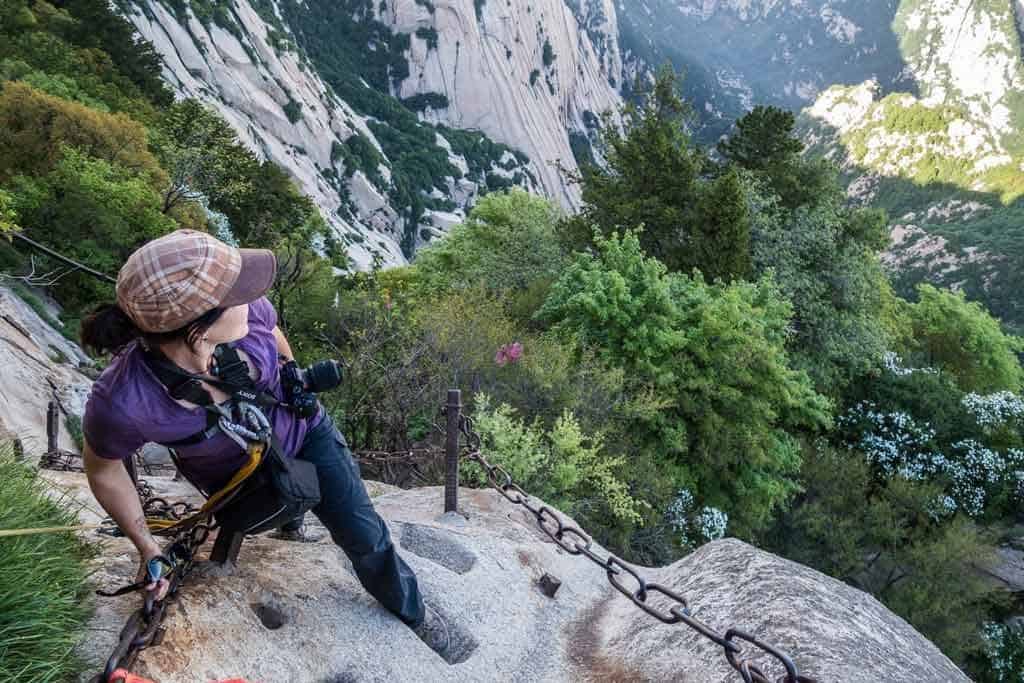
Budget for Travelling in China
China is a huge country and prices vary significantly depending on what region and what time of the year you’re visiting.
Since you’re probably interested in the range of prices of certain things you’ll definitely spend money on, we’ve decided to help.
Here’s a list of some essential expenses and their general cost range as you travel to metropolitan areas:
- Accommodation : $4 – $400+
- Food : $0.50 – $45+
- Drinks : $0.40 – $15
- Domestic/Local Transportation : $0.30 – $30
- Tours : $15 – $600+
When it comes to accommodation, the cheapest form is hostels.
In less touristy areas you can find mixed dorm beds from $4 USD per night.
Even in major cities, like Beijing and Shanghai, the prices start from $3 USD per night!
As for food, the best way to save money is to eat street food or visit a food court at a shopping mall.
The street food in China is not only cheap but also incredibly good. Even the wealthiest love to indulge in street food.
A filling meal from a street vendor would cost you up to $5 USD. But it’s usually less than that.
For transport costs, you can rent a bike, which is around $3 USD, depending on how much terrain you want to cover.
If you don’t have a budget for cultural activities, you’ll be relieved to know that there are many museums that don’t charge admission!
Flashpacker
There are a lot of mid-range accommodation options, from private rooms in hostels to private rooms in shared Airbnb and hotels.
Private rooms in hostels cost a little bit more than two beds in a mixed dorm room (around $8 USD per night) or a private room in an Airbnb (from $20 USD per night).
Mid-range hotel prices start from around $30 USD per night.
Eating out in local restaurants usually costs from $10-15 USD per meal.
The cost of an average alcoholic beverage in a bar would be around $8-10 USD.
Transport costs, such as taxi, could cost from $9 USD, of course depending on the time of the day (night fare is more expensive) and the distance you will cover.
But always ask for the price in advance before getting into the taxi!
Double rooms in a luxury hotel or a private home booked through Airbnb start from around 120$ USD per night.
Eating out at the most excellent restaurants (hotel restaurants or local ones) will cost you from $45 USD per meal.
There is an array of cultural activities available to all tastes and depending on your interest – whether it’d be visiting the Chinese national opera or the hottest night club – prices vary.
If you’re used to travelling in luxury through other countries, you can expect that China not only delivers the luxury to which you’re accustomed but also costs considerably lower when compared to other countries.
You could treat yourself to one of the most luxurious tours, such as a Zhujiajiao Water Village Tour from Shanghai.
Transportation In And Around China
China is a huge country and if you plan to travel around it – you’ll need some help.
Keep in mind that renting a car won’t be an option, since no international driver’s licence is valid in China!
Here are all the other ways to travel in cities and between them:
Chinese airlines are safe and comfortable.
There are over 1,200 routes and nearly 1,000 are domestic routes.
The most popular airports for domestic travel are in Shanghai, Guangzhou and Beijing.
Besides Macau and Hong Kong, there are over 200 airports in China that connect over a hundred internal cities and eighty foreign cities.
The most popular and reliable airlines are:
- Eastern Airlines
- Air China Limited
- Shandong Airlines
- Southern Airlines
- Shanghai Airlines
- Xiamen Airlines
- Shenzhen Airlines
- Sichuan Airlines
Public buses are generally crowded, but very affordable.
Try to avoid peak hours, as traffic jams occur in large and populous cities quite often.
The buses generally run from 6:30 in the morning to 7:30 in the evening.
In some cities they run through the night.
When you board the bus, at the front door there will be a coin box where you are expected to pay for your fare.
However, some buses have a ticket conductor that oftentimes charges according to how much distance you will cover.
The Intercity Long-Distance Bus
The intercity long-distance bus is another increasingly popular option attributed to the development and extension of highways.
All cities have coach stations which are located at the city’s railway station.
The long-distance buses operate between almost all Chinese cities.
The run time is usually from early morning to late in the evening, and for longer distances – there are fewer services throughout the day.
The buses usually have a toilet, TV, air-conditioning and some might even have a sleeping berth if it’s an overnight trip.
Mini-buses operate to try and alleviate the pressure of bus transportation.
The tickets are a bit higher in price and they’re determined by the distance you take.
Still, it is best to avoid peak hours which are from 7 am–9 am and 5 pm–7 pm.
Pay close attention to your belongings as pickpockets operate most during rush hour.
Tour buses usually feature a Chinese character ‘游’ in front of the bus number.
Tour buses are commonly seen in major Chinese cities where there are many famous highlights.
They have a predetermined scenic route and usually have a tour guide on board to share interesting bits of history and fun facts.
Trolleybus/Electric Buses
From 2010, trolleybuses have joined the public transit system in 14 Chinese cities.
All trolleybus systems in China hail from after the 1950s except in Shanghai.
Shanghai’s trolleybus system was opened in 1914 and is still operating – making it the oldest operating trolleybus system in the world.
Traveling by railway is the main means of transportation in China and its network is one of the biggest in the world.
The mileage of operating railways adds up to 124,000 kilometres and the number of passengers has surpassed 2.5 billion.
Out of the 124,000 kilometres of railway, the 22,000 kilometres are utilized by the high-speed railways.
The Chinese railway connects almost every place in China – even the most remote ones – and is the backbone of the Chinese traffic network.
The domestic trains are divided into five categories:
- High-speed/bullet trains
- Fast trains
- Tourist trains
- Express trains
- Normal trains
The High Speed/Bullet Train
This remarkable train, on average, operates fast as 250-300 km/h.
The price of tickets depends whether you want to buy first, second or business class as well as if they have a VIP category.
Some overnight trains offer soft and luxury soft sleeper options.
Many trains sell standing room tickets which cost the same as second class tickets.
The facilities are similar to those of an airplane.
The seats can be adjusted and you have use of a foldable table. Further, electrical sockets and meals and snack services are provided at a price.
This website will help with booking tickets and schedules.
The major cities have metro systems either already in operation, in planning stages or under construction.
The underground transit is developing at rapid speeds.
This is because one of the priorities to make China a greener country is to reduce the pollution of its cities and improve the quality of living.
Chinese metro systems are immaculate. They transfer large amounts of people, are very frequent and nearly always on time.
This contributes to diminishing the traffic jams and above ground transit.
The Shanghai Metro is the longest metro system in the world.
Taxi is a very convenient mode of transport and surprisingly not too expensive.
In major cities, all vehicles have a meter.
If you’re situated in a smaller town, ask at your hotel for a price estimate.
And if you’re thinking of covering a long distance, it’s possible to negotiate a deal.
Taxis are available at nearly all times and everywhere.
Chinese taxi drivers have a reputation of being very honourable. But it is always good practice to exercise caution.
China has over 110 thousand kilometres of navigable streams, lakes, rivers and canals.
The Grand Canal is 1794 kilometres long. It connects seventeen cities (from Beijing to Hangzhou) and five rivers (Huaihe, Qintang, Haihe, Yangtze and Huanghe.)
Since so many railways and highways have been built in recent years, waterway transport has diminished.
But there are still ways to move around the country via waterway – especially the Yangtze cruise (Baidi to Yichang), Beijing-Hangzhou Grand Canal and the Li River cruise (Guilin – Yangshuo).

Accommodation in China
There is a lot of variety and options when it comes to accommodation in China.
On one hand, you can stay in a very cheap hostel (which doesn’t mean that it lacks quality!).
But China is also full of luxurious hotels and villas.
When picking a place to stay, you should be aware of the fact that, in the Chinese language, there are different words for hotel and they indicate the status of the place.
- Dajiudian – “Big wine shop” – luxury accommodation
- Shan Zhuang – “Mountain resort” – accommodation in the countryside
- Binguan & fandian – a general term for a hotel and can mean anything from an average hotel to a smart hotel.
- Kèzhàn – Basic guesthouse
- Zhāodàisuŏ – Hostel
- Lǚguăn/ lǚshè – inn
- Zhùsù – accommodation
China is one of the best places in the world when it comes to the number of affordable accommodation options!
The network of hostels in China is ever-expanding and most of them are affiliated with the International Youth Hostel Association.
They tend to have clean and modern facilities, nicely designed social spaces, friendly and English speaking staff and fast Wi-Fi.
Getting around China is challenging if you don’t speak the language, but the staff from hostels usually are willing to help you on your way.
They will gladly write the places that you need to visit or a couple of useful phrases to ease day to day communication.
Also, even booking a private room in a hostel is considerably cheaper when compared to European countries.
The quality of hostels is good and the prices tend to be very low.
If you’re in Shanghai, staying at the Mingtown Nanjing Road Youth Hostel will cost around $9 per night.
The dorms have 6 beds and male and female dorms are separate.
A deluxe private room in Beijing’s Chinese Box Courtyard Hostel costs around $50 and breakfast is included in the price.
The hostel also has a couple of free thematic nights, such as the free vegetarian dumpling party or the professional and traditional Chinese Kongfu tea course!
When it comes to cheap hotels, you will usually find these located near bus or train stations.
Chinese locals usually rent beds and not rooms, so doubling up with strangers isn’t uncommon, especially as a means of saving money.
But foreigners are not allowed to share a room with Chinese people.
Instead, they have to rent a whole room. But usually, you will be able to negotiate a good price.
If you’re an avid camper, just know that it is only possible to camp in Hong Kong.
There are free campsites all over the New Territories and in the beautiful nature of Qinghai, Gansu, Inner Mongolia, Xinjiang, Yunnan, Sichuan and Tibet.
But just know that to camp, you would have to obtain a government-issued permit.
Hong Kong, Macau and few southwestern provinces have a number of privately owned guesthouses.
They range in size and quality, from tents to family mansions.
A double room in one of these guesthouses is usually cheaper than in a hotel.
There is at least one mid-range hotel in every town in China.
But the quality of the hotel is hard to predict from the price itself.
An old hotel with faulty bathrooms and washed out sheets could charge you the same as a newly opened establishment.
The general rule is to always try to book the newer place.
In more isolated places, you should be able to find a double room for $20 USD per night. But in bigger cities from $40 USD per night.
One thing you can always rely on when staying in a Chinese hotel is that you will be left with a pair of plastic or paper slippers and a vacuum flask of hot water that can be refilled by the staff!
If you’re in Chengdu, the Chengdu Rising Butterfly Hotel is one of the best options.
Either a business twin room or a queen room costs a little over $50. And in some cases, breakfast is included in the price.
The Holiday Inn Express Yizhuang in Beijing will be a great experience.
The price of a standard room with free breakfast for two is usually around $70. But you can often find discounts and pay around $40!
Luxury hotels are situated in larger cities and offer the same level of service as any four or five-star hotel anywhere else in the world.
They have the same facilities that are to be expected: gyms, swimming pools and business centers.
The price of a double room will be from $120 upwards and an additional 15% service charge will be added.
The Niccolo Chengdu hotel is one of the most popular of its kind.
The very luxurious hotel will offer an incredible experience that will satisfy any type of guest – all for the price of $150 per night!
The Upper House in Hong Kong is the epitome of glamour and it’s especially great for business travel.
It has the largest hotel rooms in Hong Kong, along with ocean views and an amazing location.
The prices start at around $400, but the largest penthouse costs over $2000!
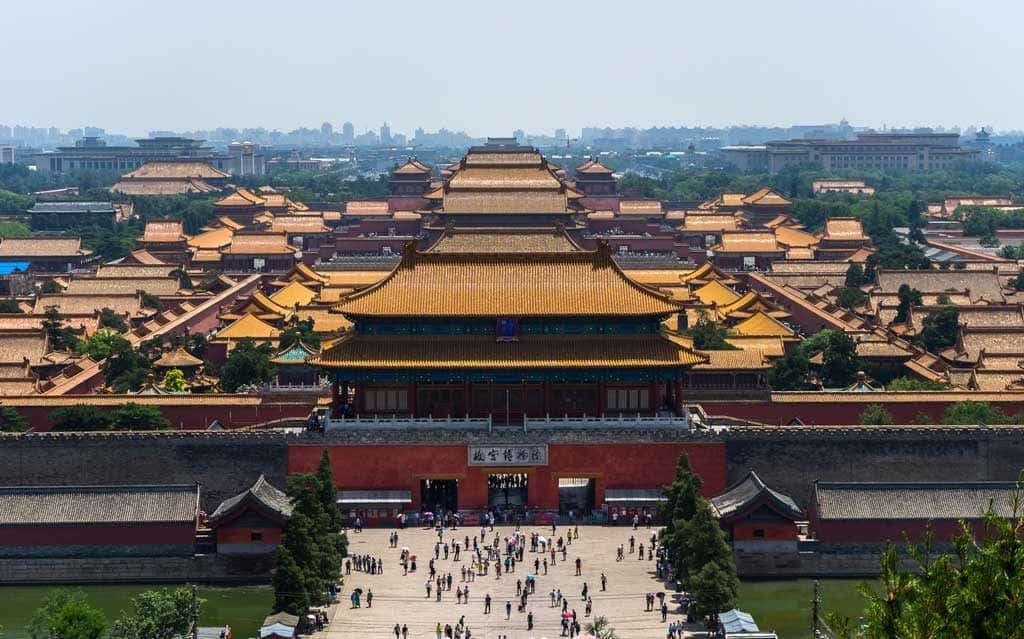
Safety While Travelling in China
China is regarded as a pretty safe and non-violent country.
If there is unrest it’s typically contained within certain areas.
Petty Crime
The biggest dangers are petty crimes such as pickpocketing – which with administering precaution is preventable.
Travellers are targets for pickpockets and thieves.
These thieves usually operate near train and bus stations, hard-seat train carriages, intercity but also long-distance buses (especially take precaution if you’re boarding the sleeper bus) and public toilets.
It is not advisable for women to travel solo.
Always check your restaurant bill to make sure you are not being charged extra for hidden expenses and avoid paying by credit card so you can make sure they won’t add any extra charges.
Safety in Taxis
The most widespread scam are the taxi scams at the Beijing Airport.
Always queue at the taxi rank and insist that the driver uses his meter.
Avoid pedicabs and motorized three-wheelers. Many times these drivers will agree on an initially negotiated price and then after you arrive at the destination they insist on a different sum, which sometimes can even be 10x the initial agreement.
Traffic Accidents
One of the dangers when traveling in China are the high numbers of traffic accidents.
The World Health Organization (WHO) made an estimate that there are approximately 600 vehicular deaths per day.
When taking a long-distance bus you’ll find that there are no seatbelts. Even taxis outside of major cities oftentimes don’t have rear seatbelts fitted.
The biggest danger is crossing the street no matter how ridiculous it sounds.
In China there are a large number of electric cars and hoverboards that run silently and you probably wouldn’t even hear them until it’s too late.
The red lights in China don’t mean much for Chinese drivers as they often run through them. So even the green figure signaling that it’s safe to cross doesn’t always mean that.
Medical System In China
The healthcare system in China is a mix of public and private services.
Major cities such as Beijing and Shanghai have hospitals with world-class care and specialist services.
Rural regions sometimes lack even the very basic healthcare services.
Sometimes healthcare options are limited to only types of traditional medicine such as acupressure, herbal remedies and acupuncture.
You should always travel with travel insurance ! A comprehensive travel medical insurance is mandatory for visitors.
If you are treated at a private hospital the price difference between a private and a public hospital is significant.
If you’re suffering serious health issues and at the time of medical assistance you’re in one of the more remote areas, you will have to organize an expensive airlift.
Preparation is key to easy and safe travels.
Make sure that your policy includes medical evacuation, translation service and private hospitals to ensure maximum comfort.
Packing List For Travel To China
While there is always a variety of packing options depending on the season and length of travel, these are the travel essentials we recommend for your trip to China.
Note: This list is intended for trips during spring and summer.
Clothing And Wardrobe For Men And Women
- 3x Comfortable, long pants
- 5x Short-sleeved shirts
- 2x Long-sleeved shirts
- 1x Wool sweater
- 1x Windbreaker/rain jacket
- 1x Fleece jacket
- 1x Flip flops
- 1x Adventure sandals
- 1x Waterproof shoes
- 1x Hiking shoes
- Undergarments
- Breathable socks
Miscellaneous Items
- Extra SD memory card
- A cellphone (make sure to have an offline Translator App, phrasebook, copies of needed travel documents and ids, currency converter, copy of your insurance card/policy and emergency contact info)
- Portable battery
- Power adapter
- Sunhat with a wide brim and a chin strap
- Insect repellent
- Toilet paper
- Hand sanitizer
- Guide book and a map
- Pocket knife
- Book with everyday phrases in Chinese
- Reusable water bottle
Check Out Our China Travel Blogs
Surviving the world’s most dangerous hike – mt huashan, the 10 best things to do in hangzhou, china (2024 guide), 26 awesome things to do in beijing, china (2024 guide), the perfect 3 days in taipei itinerary [2024 guide], 3 days in chengdu, china – the perfect itinerary, tianducheng – china’s strange city of paris, mount cangshan – hiking high in dali, falling in love with shaxi, china, the ‘real’ china – the ancient village of chengyang, enchanting beauty and sustainability in yangshuo, china, hiking the dragon’s backbone at longji rice terraces, how to visit zhangjiajie national forest park (the avatar mountains).

Complete Guide to Traveling to China
- nichetochina.com
- July 13, 2024
Table of Contents
So, you’re ready to embark on an unforgettable journey to china , but where do you begin what should you expect how can you make the most out of your trip, don’t worry; we’ve got you covered with this comprehensive guide to traveling to china. from planning your itinerary to navigating cultural nuances, here’s everything you need to know to ensure a seamless and enriching travel experience., traveling to china can be an exciting and rewarding adventure, but it requires careful planning and preparation. in this guide, we’ll walk you through the step-by-step process of planning your trip to china, from choosing the best time to visit to understanding cultural customs and exploring must-see destinations. whether you’re a seasoned traveler or venturing abroad for the first time, this guide will help you make the most of your journey to this captivating country.
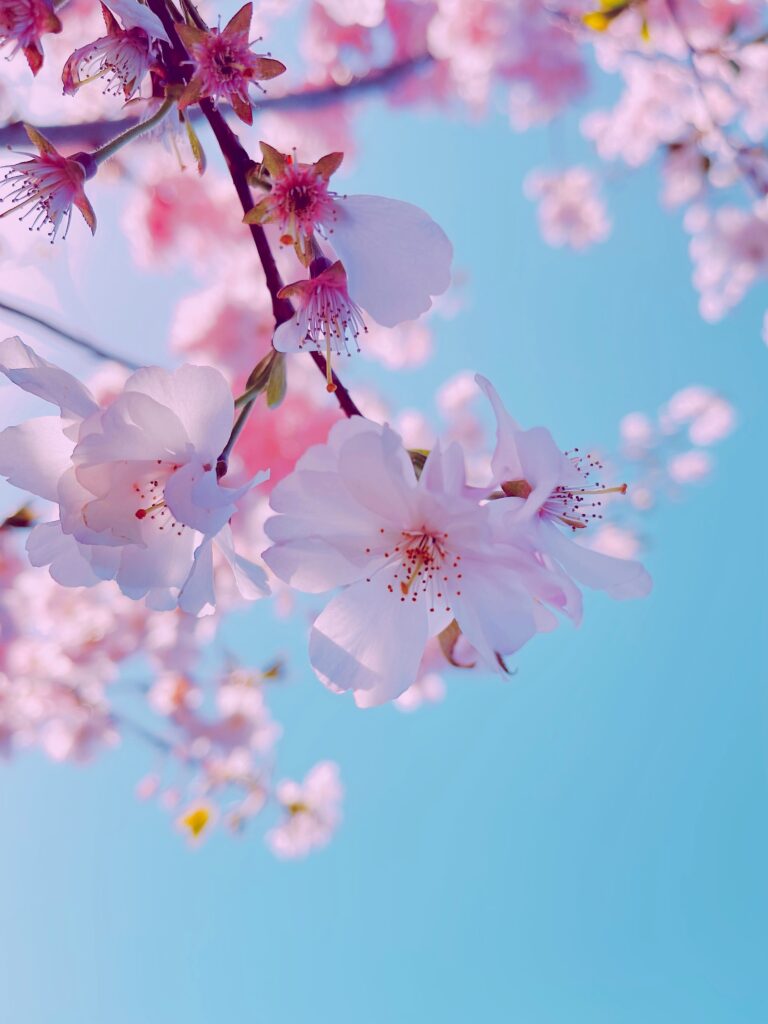
Before booking your flight to China, let’s talk about the best time to go! China’s got all sorts of climates, from warm and tropical down south to chilly up north. So, when you visit really depends on what you wanna do and where you want to travel. But hey, if you’re looking for perfect sightseeing weather , spring (March to May) and autumn (September to November) are your best bets. The temperatures are nice and mild, the skies are clear, and it’s just lovely for exploring. Oh, and let’s not forget about the flowers! In springtime, you’ll be treated to a stunning display of sakura blossoms, painting the landscape pink in March to May. It’s like walking through a dreamland of petals and beauty,trust me, you don’t wanna miss it!
Planning Your Itinerary:
With its vast size and rich cultural heritage, China offers an abundance of attractions and experiences to explore. Whether you’re drawn to the bustling metropolises of Beijing and Shanghai, the ancient wonders of the Great Wall and Terracotta Army, or the scenic beauty of Guilin and Zhangjiajie, crafting a well-rounded itinerary is key to maximizing your time in China. Consider factors such as transportation options, entrance fees, and opening hours when planning your itinerary to ensure a smooth and enjoyable journey.
Practical Tip: Opt for budget accommodations such as hostels, guesthouses, or Airbnb to save money on lodging. Consider staying in centrally located areas to minimize transportation costs.
– App Suggestion: Download Maps.me for offline navigation and Baidu Translate for overcoming language barriers.Microsoft Translator offline version.
– Practical Tip: Eat like a local by dining at street food stalls and local eateries, where you can enjoy authentic cuisine at affordable prices.

Exploring Must-See Destinations:
No trip to China would be complete without visiting its iconic landmarks and hidden gems. Whether you’re marveling at the Forbidden City’s grandeur, admiring the serene beauty of West Lake in Hangzhou, or exploring the vibrant street markets of Chengdu, each destination offers a unique glimpse into China’s rich history and diverse culture. Be sure to venture off the beaten path to discover lesser-known treasures and immerse yourself fully in the local way of life.
Practical Tip: Take advantage of free or discounted entry days at popular tourist attractions to save money on entrance fees.
Understanding Cultural Customs:
As you prepare for your trip to China, familiarizing yourself with the country’s cultural customs and etiquette can help you navigate social interactions with ease and respect. From greeting locals with a friendly “ni hao” and “Xie Xie” to observing traditional customs such as tea ceremonies and chopstick etiquette, embracing Chinese culture adds depth and meaning to your travel experience. Additionally, be mindful of cultural sensitivities regarding topics such as politics, religion, and personal space to avoid unintentional misunderstandings.
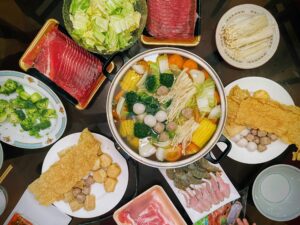
Embracing Culinary Adventures:
One of the highlights of traveling to China is undoubtedly the opportunity to indulge in its world-renowned cuisine. From savory dumplings and aromatic stir-fries to delicate tea ceremonies and spicy hotpot, Chinese cuisine delights the senses and tantalizes the taste buds. Don’t be afraid to try new dishes and flavors, and seek out authentic local eateries for a truly immersive culinary experience. Remember to respect dining customs, such as offering to pay the bill or leaving a little food on your plate as a sign of politeness.
– Practical Tip: Visit local markets and food stalls for budget-friendly dining options and authentic culinary experiences.
– App Suggestion: Use Dianping or Yelp to discover highly-rated restaurants and street food vendors recommended by locals.
Navigating Transportation:
Getting around China can seem daunting at first, given its vast size and complex transportation network. However, with careful planning and a sense of adventure, navigating China’s transportation system can be both efficient and enjoyable. Whether you’re traveling by high-speed train, domestic flight, or local bus, be sure to book tickets in advance, allow extra time for unforeseen delays, and embrace the unique sights and sounds of each mode of transportation.
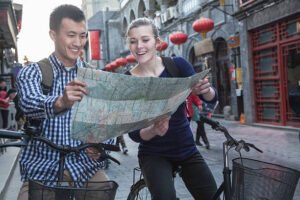
When you’re exploring a city in China, hopping on public transport is the way to go! It’s super affordable, starting at just 1 RMB (that’s like 14 cents in the USA, UK, and Australia!). You can pay with cash or even scan through We ChatWeChat, how cool is that? Plus, it’s a great way to soak up the local vibes and see how people get around. Hop on an electric bus for a speedy ride, especially if you’re headed somewhere nearby. And guess what? In some cities, you can even find nifty barcode-scannable bicycles for a fun little spin around town. So, ditch the expensive cabs and embrace the joy of city travel on a budget!
Practical Tip: Travel by overnight trains or buses to save on accommodation costs and maximize your time exploring during the day.
App Suggestion: Download the China Railways app for booking train tickets and checking schedules on-the-go. Use Didi Chuxing or Meituan Dianping for convenient and affordable ridesharing or taxi services within cities.
Staying Safe and Healthy:
While traveling to China is typically safe for visitors, you need take care to guarantee your health and well-being throughout your trip. Drink bottled water, avoid street food with questionable hygiene, and bring any required prescriptions and travel insurance.

To avoid theft or pickpocketing, become familiar with popular frauds and tourist traps, and remain attentive in crowded areas. In addition, follow any travel advisories or suggestions issued by official authorities to keep aware about possible risks or hazards.
– Practical Tip: Carry a refillable water bottle and use water purification tablets or filters to avoid purchasing bottled water, saving money and reducing plastic waste.
– App Suggestion : Install a translation app such as Pleco or Google Translate for communicating with locals and accessing important information in Chinese
Immersing Yourself in Local Culture:
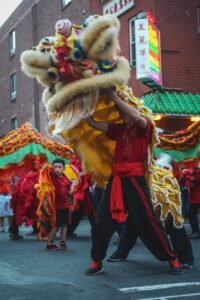
– Practical Tip: Participate in free or low-cost cultural activities such as morning tai-chi sessions in public parks or visiting local temples and museums.
– App Suggestion : Use WeChat to connect with locals, join community groups, and access exclusive events and experiences.
Capturing Memories:

As you journey through China’s breathtaking landscapes and vibrant cities, don’t forget to capture the moments that make your travel experience truly unforgettable.
– Practical Tip: Invest in a quality camera or smartphone with a good camera to capture stunning photos of China’s landscapes, architecture, and people.
– App Suggestion: Use Instagram or Facebook to share your travel photos with friends and followers, inspiring others to explore China.
Reflecting and Sharing:
As your journey to China comes to an end, take time to reflect on the lessons learned, experiences gained, and connections made along the way. Consider how your travels have impacted your perspective and enriched your life, and share your stories and insights with friends, family, and fellow travelers. Whether through social media posts, blog articles, or personal conversations, sharing your travel experiences fosters understanding, inspiration, and a sense of connection with others who share your passion for exploration and discovery.
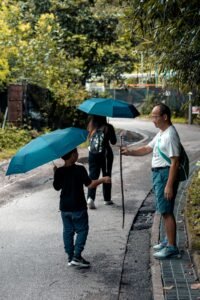
– Practical Tip: Share your travel experiences and tips on social media, travel forums, or personal blogs to inspire and inform other travelers. You also may write to us.
– App Suggestion: Use Evernote or Trello to organize your travel notes, photos, and memories for future reference or storytelling.
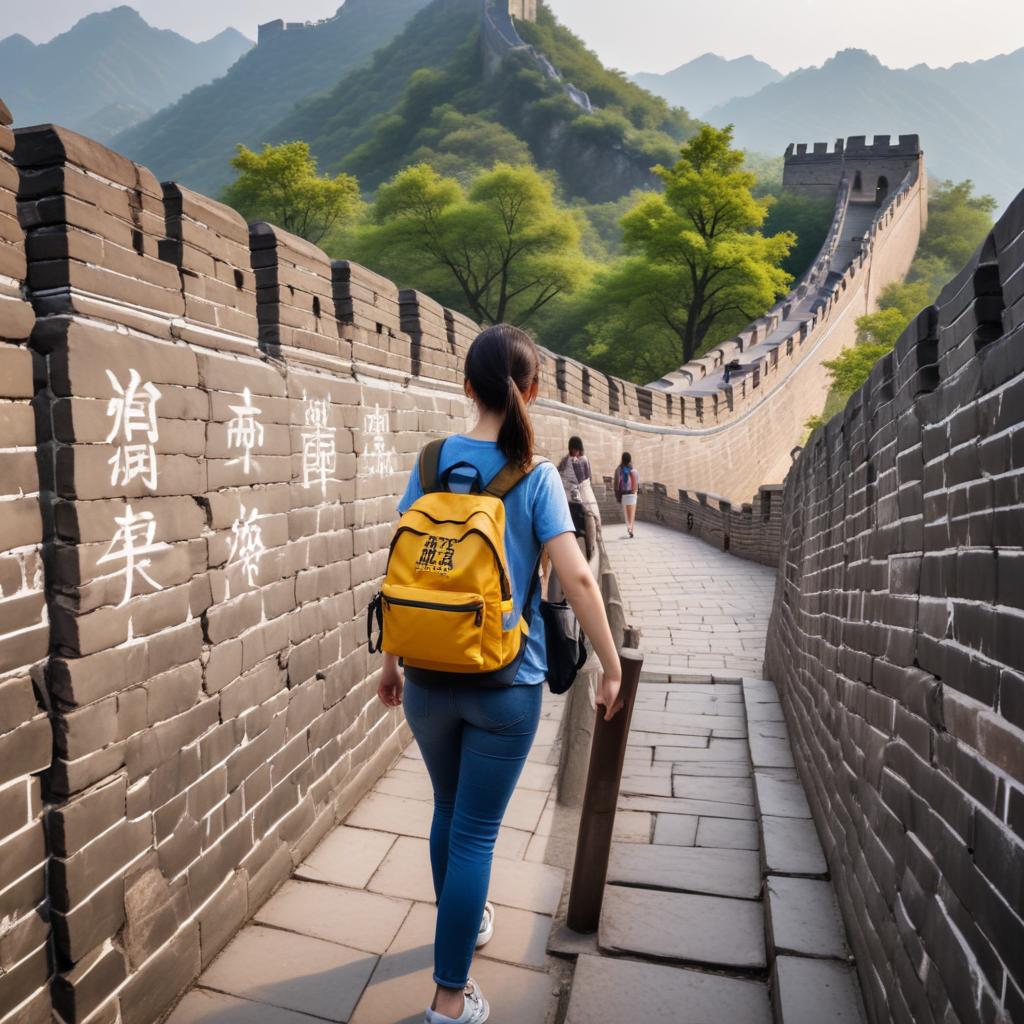
চীনে উচ্চশিক্ষা: বাংলাদেশি শিক্ষার্থীদের জন্য সম্পূর্ণ গাইড 2024

5 Top Websites for Finding the Cheapest Air Tickets to China (Insider Tips and Tricks)

How to Get a Student Visa for China: A Comprehensive 2024 Guide
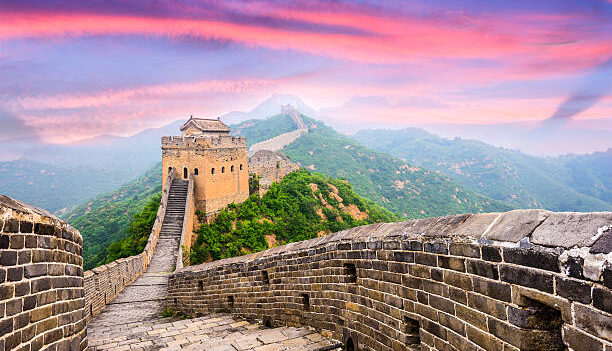
Your Complete Guide to Traveling to China: A Step-by-Step Guide 2024/2025 Updated
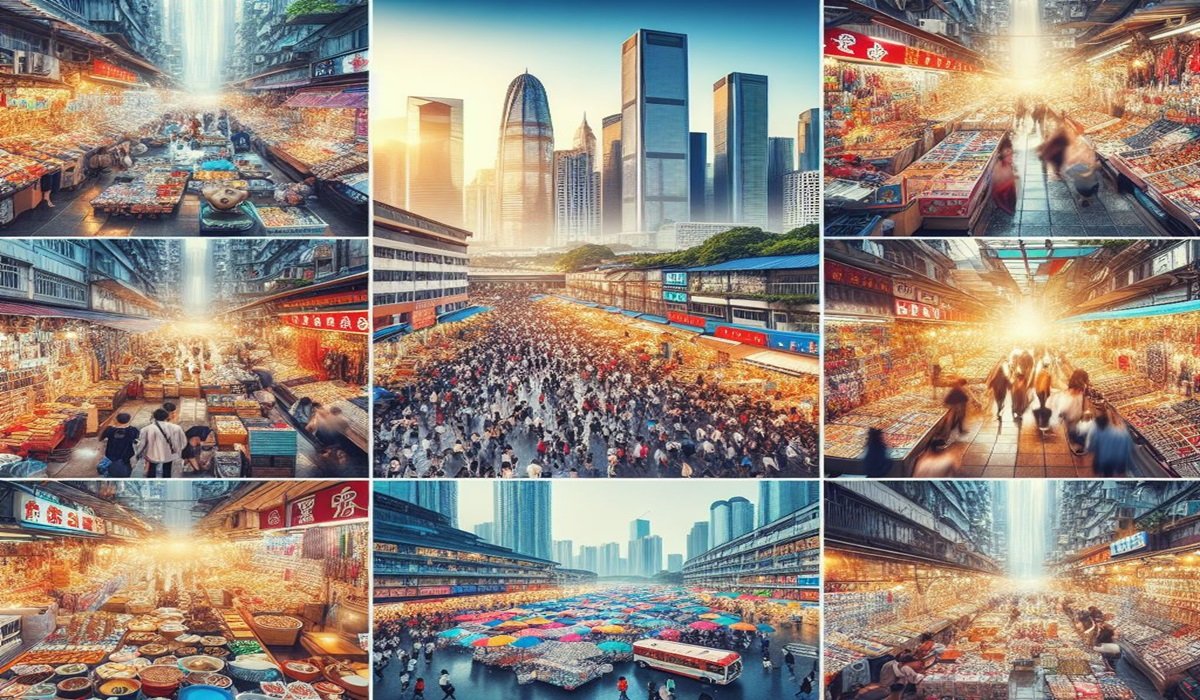
Unlocking China’s Top 7 City Secrets: Your Guide to Product Sourcing by City Specialties.
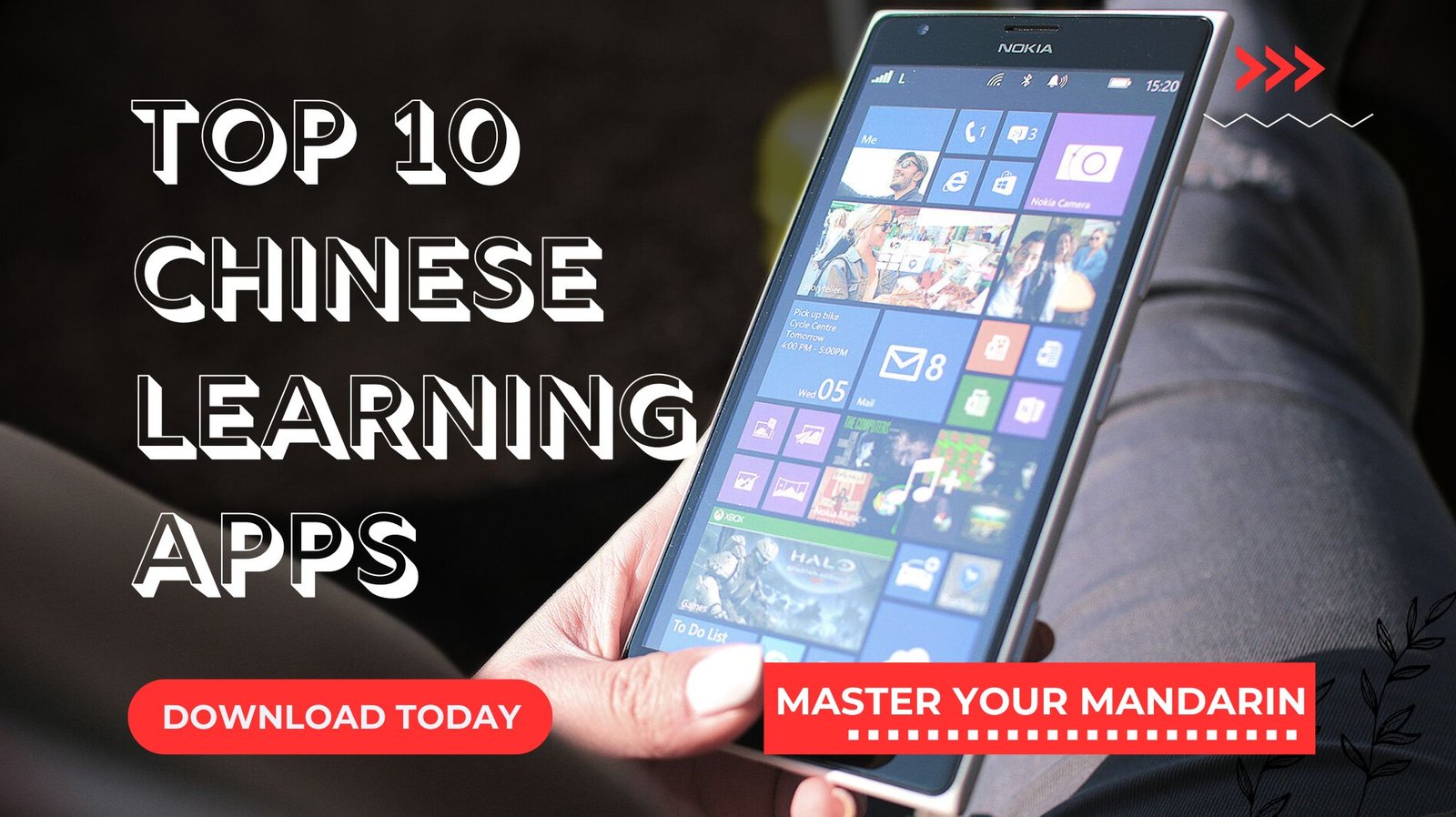
Top 10 Best Chinese Learning Apps & Websites (2024)
Join our community.
Get the latest updates on travel tips, business insights, educational resources, and cultural experiences. Let us be your window to China.
US Travel Header Utility Menu
- Future of Travel Mobility
- Travel Action Network
- Commission on Seamless & Secure Travel
- Travel Works
- Journey to Clean
Header Utility Social Links
- Follow us on FOLLOW US
- Follow us on Twitter
- Follow us on LinkedIn
- Follow us on Instagram
- Follow us on Facebook
User account menu
U.s. travel comments on end of testing policy for inbound chinese travel.
PRESS RELEASE March 09, 2023
WASHINGTON -
U.S. Travel Association President and CEO Geoff Freeman issued the following statement on news that the U.S. Centers for Disease Control and Prevention (CDC) plans to end mandatory COVID-19 tests for travelers from China to the United States:
“We applaud the Biden administration for implementing a sensible policy and changing that policy as the situation evolved. The same logic should be utilized to immediately eliminate the vaccine requirement for international visitors to the U.S.”
U.S. Travel Association is the national, non-profit organization representing the $1.3 trillion travel industry, an essential contributor to our nation's economy and success. U.S. Travel produces programs and insights and advocates for policies to increase travel to and within the United States. Visit ustravel.org for more information.
Greg Staley
Senior Vice President, Communications
202.408.2162
🙌 Awesome, you're subscribed!
Thanks for subscribing! Look out for your first newsletter in your inbox soon!
Get us in your inbox
Sign up to our newsletter for the latest and greatest from your city and beyond
By entering your email address you agree to our Terms of Use and Privacy Policy and consent to receive emails from Time Out about news, events, offers and partner promotions.
Awesome, you're subscribed!
The best of Hong Kong for free.
Sign up for our email to enjoy Hong Kong without spending a thing (as well as some options when you’re feeling flush).
Déjà vu! We already have this email. Try another?
- Things to Do
- Food & Drink
- Shopping & Style
- Coca-Cola Foodmarks
- Restaurants
- Music & Nightlife
- Los Angeles
Non-Chinese Mainland Travel Permit: A step-by-step guide to applying
Here's everything you need to know

Starting July 10, non-Chinese permanent residents of Hong Kong and Macau can apply for a special permit to cross over to mainland China for up to 90 days at a time – whether it's for sightseeing or business purposes. Up until now, the fast-track immigration channels were only open to Hong Kong residents with 'Home Return Permit' cards, but now, this new travel permit is going to give everyone the same speedy access, without having to deal with customs declarations when coming and going. Read on for our guide on how to get started.
Who can apply for the non-Chinese Mainland Travel Permit?
This permit, not limited to any nationality or industry, is intended for non-Chinese Hong Kong and Macau permanent residents who wish to travel to the mainland for short-term purposes. Applicants under the age of 18 can also apply, but they must be accompanied by their guardians.
What are the required documents for the Non-Chinese Mainland Travel Permit?
Make sure you have a valid Hong Kong permanent identity card, a passport with a validity period of at least six months (excluding passports not recognised by the Chinese government), and a completed Application Form for Mainland Travel Permit for Hong Kong and Macau Residents (Non-Chinese Citizens) with a recent photo.
Whether you’re from Hong Kong or Macau, you will also need a nationality certificate that is issued within six months prior to the date of application, which is either a Notice of Application for Access to Information from the HK Immigration Department, or the Certificate of Personal Data issued by the Macao Identification Services Bureau.
How long does it take to get my Non-Chinese Mainland Travel Permit?
The permit will be issued within 20 working days after the application is officially accepted, and needs to be picked up within 12 months at one of the designated service centres. If you fail to collect it in time without justifiable reasons, the permit will be waived and cancelled. For applicants under the age of 18, their legal guardians can collect the permit on their behalf.
How much does the application cost?
The fee for the first application from Hong Kong is $260, while the fee for renewal or replacement from mainland China is 230 RMB.
A step-by-step guide to applying for the Non-Chinese Mainland Travel Permit:
Step 1: Complete an application form on the China Travel Service(CTS) Entry Permit Service Hong Kong Limited's website that requires your personal information, such as images of your Hong Kong Permanent Resident Identity Card and passport.
Step 2: After you’ve received an email notifying you that your pre-application has passed the preliminary review, you can log into the reservation system to book an appointment at a designated service centre. Make sure to bring with you a completed application form, Hong Kong Permanent Resident Identity Card, passport, and nationality certificates.
Step 3: If your application was successful after the payment and registration, you will receive an acceptance receipt that states your scheduled collection date.
Step 4: Simply pick up your permit within 12 months of the scheduled collection date and you’re good to go!
CTS Entry Permit Service Centres addresses
Hong Kong Island Service Centre 14/F Low Block, Grand Millennium Plaza, 181 Queen’s Road, Central
Kowloon East Service Centre 202 Tower 1, Enterprise Square, 9 Sheung Yuet Rd. Kowloon Bay
Kowloon West Service Centre 20F/, 22/F, K83, Tai Lin Pai Road, Kwai Chung
New Territories East Service Centre Unit J, 26/F, Kings Wing Plaza, 1 On Kwan Street, Shek Mun, Sha Tin
New Territories West Service Centre Unit 2707-2716 27/F, Tuen Mun Central Square, 22 Hoi Wing Road, New Territories
Mongkok Temporary Service Centre 3/F Tak Po Building, 62-72 Sai Yee Street, Mongkok
Recommended stores:
The ultimate guide to Hong Kong Airport restaurants
The 50 best restaurants in Hong Kong
Go Park Sai Sha: Opening date, venues, attractions, and more
Follow us on Youtube , Facebook , Instagram , and Threads , or subscribe to our newsletter for the latest news and updates on what's going on in the city.
Been there, done that? Think again, my friend.
Discover Time Out original video
An email you'll actually love
- Press office
- Investor relations
- Work for Time Out
- Editorial guidelines
- Privacy notice
- Do not sell my information
- Cookie policy
- Accessibility statement
- Terms of use
- Modern slavery statement
- Manage cookies
- Sign up to our newsletter
- Advertising
- Express Advertising
- Time Out Market
Time Out products
- Time Out Worldwide
Time Out magazine
- Print edition
- Digital edition
- Skip to main content
- Keyboard shortcuts for audio player
- Afghanistan
- Middle East
- Latin America
- Subscribe to NPR's Up First Email

Mikel Oyarzabal of Spain celebrates as Spain wins the UEFA European Championship final match against England at Olympiastadion in Berlin on Sunday. Hesham Elsherif/Anadolu via Getty Images hide caption
Perspective
Soccer's diversity unites a divided europe, sort of.
July 15, 2024 • Four weeks of chanting and shouting on the streets were not expressions of anger about politics — but the sound of joy and excitement about the European Championship soccer tournament.

Tourists visit Nyhavn, the 17th-century waterfront, in Copenhagen, Denmark, in this 2021 file photo. Jonathan Nackstrand/AFP via Getty Images hide caption
Copenhagen begins offering free perks to tourists who make sustainable choices
July 15, 2024 • The pilot program comes as residents in other parts of Europe have been denouncing — and in some cases confronting — the droves of tourists who flock to its historic cities and picturesque beaches every year.

A forklift driver loads a truck with food on the Israeli side of the Kerem Shalom border crossing with southern Gaza on Wednesday. Israel says food is going into southern Gaza daily but is piling up on the Gaza side because the United Nations and aid groups aren't distributing it in a timely fashion. The U.N. says Israeli military operations and other war-related obstacles hamper its efforts. Maya Levin for NPR hide caption
Middle East crisis — explained
Food aid is piling up inside gaza. here's why it's not reaching those in need.
July 15, 2024 • Israel says large quantities of food aid are piling up just inside the Gaza border. Aid groups say Israeli military operations and other obstacles prevent its delivery to desperate Palestinians.

Members of the Lebanese army and the Italian contingent of the UNIFIL peacekeeping force inspect a house destroyed by an Israeli attack during a patrol in Yarine on June 10, 2024. Diego Ibarra Sánchez for NPR hide caption
U.N. peacekeepers take cover as Lebanon's Hezbollah and Israel trade attacks
July 15, 2024 • “The situation is really quite volatile,” Capt. Alessandro Crepy, with the Italian contingent of the peacekeeping group UNIFIL, says of the fighting between forces in Israel and Lebanon.
Rocket exchanges between Israel and Hezbollah hit new highs in the past week

Andrii Denysenko, CEO of design and production bureau "UkrPrototyp," stands by Odyssey, an 800-kilogram (1,750-pound) ground drone prototype, at a cornfield in northern Ukraine on June 28, 2024. Facing manpower shortages and uneven international assistance, Ukraine is counting heavily on innovation at home to halt Russia’s incremental but pounding advance in the east. Anton Shtuka/AP hide caption
Ukraine invasion — explained
Ukrainian startups are creating a low-cost robot army to fight russia.
July 15, 2024 • An ecosystem of labs in hundreds of secret workshops is leveraging innovation to create a robot army that Ukraine hopes will kill Russian troops and save its own wounded soldiers and civilians.

Tested: The Choice
July 15, 2024 • Episode 1: Would you alter your body for the chance to compete for a gold medal? That's the question facing a small group of elite athletes right now. Last year, track and field authorities announced new regulations that mean some women can't compete in the female category unless they lower their body's naturally occurring testosterone levels. You'll meet one of those runners, Christine Mboma, a reigning Olympic silver medalist, and hear about the difficult choice she faces. To listen to this series sponsor-free and support NPR, sign up for Embedded+ in Apple Podcasts or at plus.npr.org.

Peter Nyongesa walks through the mangroves to monitor his beehives in the Bangladesh slums in Mombasa, Kenya, on May 30, 2024. The 69-year-old Nyongesa recalled how he would plead unsuccessfully with loggers to spare the mangroves or cut only the mature ones while leaving the younger ones intact. So he has turned to deterring the loggers with bees, hidden in the mangroves and ready to sting. Gideon Maundu/AP hide caption
Environment
To protect mangroves, some kenyans combat logging with hidden beehives.
July 15, 2024 • As part of a local conservation effort, beehives dot a section of coastline in Mombasa to try to deter people who chop mangroves for firewood or home construction.

Ksenia Karelina, also known by the last name of Khavana, sits in a defendant’s cage in a court in Yekaterinburg, Russia, on June 20, 2024. The dual Russian-U.S. citizen was arrested on treason charges in Yekaterinburg in February after returning from Los Angeles to visit relatives. The charges reportedly stem from her $51 donation to a U.S. charity that helps Ukraine. File photo/AP hide caption
Treason and espionage cases are rising in Russia since the war in Ukraine began
July 14, 2024 • Treason cases have been rare in Russia in the last 30 years, with a handful annually. But since the 2022 invasion of Ukraine, they have skyrocketed, along with espionage prosecutions.

Nita Ambani, wife of Asia's richest man, Mukesh Ambani, arrives holding a lamp with an image of elephant-headed Hindu god Ganesha, for the wedding of their youngest son, Anant Ambani in Mumbai on Friday. Rafiq Maqbool/AP hide caption
Every ceremony at India's star-studded Ambani wedding, explained
July 13, 2024 • Kim Kardashian, Bill Gates and other celebs gathered in Mumbai for the "wedding of the year," the marriage of the son of Asia's wealthiest man. But what are all the ceremonies that they witnessed?

Palestinians gather near the bodies of their relatives killed in the Israeli bombardment of the Gaza Strip, at a hospital morgue in Deir al-Balah, on Saturday. Abdel Kareem Hana/AP hide caption
Israel targets Hamas commander in airstrikes that kill 90 Palestinians
July 13, 2024 • The powerful Israeli strike was directed at the head of the Hamas military wing, Mohammed Deif. But Prime Minister Benjamin Netanyahu acknowledged he didn't have definitive information on Deif's fate.

South Korean comedian Yoon Seong-ho, known as NewJeansNim, wearing monk's robes and performing during an electronic dance music party event for the annual Lotus Lantern Festival to celebrate the Buddha's birthday in Seoul, on May 12. Jung Yeon-Je/AFP via Getty Images hide caption
A Buddhist DJ hopes to spin followers toward the faith in South Korea
July 13, 2024 • Yoon Seong-ho is a 47-year-old Buddhist, comedian, DJ and rising celebrity.
What one religion in South Korea is doing to attract new followers

Iranian rights activist Masih Alinejad speaks during a press conference in association with the World Liberty Congress to urge action on political prisoners around the world in Washington, DC, on March 12. Saul Loeb/AFP via Getty Images hide caption
State of the World from NPR
When a foreign government is trying to kill you on u.s. soil.
July 12, 2024 • The United States Justice Department says it has foiled at least four assassination plots sponsored by foreign governments on U.S. soil. One of the targets of those assassination attempts is Masih Alinejad, an Iranian-American journalist and activist who Iran allegedly tried to have killed in New York. We hear how knowing she is at such risk has turned Alinejad's life upside down.

Palestinians look for survivors after an Israeli airstrike in Rafah refugee camp, southern Gaza Strip, Thursday, Oct. 12, 2023. Hatem Ali/AP hide caption
Up First Newsletter
Why poor debate may not have hurt biden. and, israel orders another gaza city evacuation.
July 12, 2024 • A new NPR poll shows where things stand after Biden's bad debate. Many Palestinian residents in Gaza were just returning to find their homes gone.

The symbol of the United Nations is displayed outside the Secretariat Building, Feb. 28, 2022, at United Nations Headquarters. John Minchillo/AP hide caption
The world's population is projected to peak at 10.3 billion in the 2080s, U.N. says
July 12, 2024 • Additionally, the global life expectancy is beginning to climb again post-COVID pandemic, and is now 73.3 years of age. It is anticipated to climb to 77.4 years in 2054.

Introducing Tested from NPR and CBC
July 12, 2024 • Who gets to compete? Since the beginning of women's sports, there has been a struggle over who qualifies for the women's category. Tested follows the unfolding story of elite female runners who have been told they can no longer race as women, because of their biology. As the Olympics approach, they face hard choices: take drugs to lower their natural testosterone levels, give up their sport entirely, or fight. To understand how we got here, we trace the surprising, 100-year history of sex testing. Tested is a new 6-part series from NPR's Embedded and CBC. Hosted by journalist Rose Eveleth, it launches July 15, ahead of the 2024 Olympic Games. Embedded+ supporters enjoy early and ad-free access.

Palmer Luckey, 31, founder of Anduril Industries, stands in front of the Dive-LD, an autonomous underwater drone at company headquarters in Costa Mesa, Calif. Anduril recently won a U.S. Navy contract to build 200 of them annually. Philip Cheung for NPR/NPR hide caption
Consider This from NPR
This u.s. company is helping arm ukraine against russia — with ai drones.
July 11, 2024 • Palmer Luckey launched his first tech company as a teenager. That was Oculus, the virtual reality headset for gaming. Soon after, he sold it to Facebook for $2 billion.

President Biden speaks at a news conference on Thursday, on the final day of the NATO summit in Washington. Jacquelyn Martin/AP/AP hide caption
Biden says he's 'determined on running' as calls to step aside grow
July 11, 2024 • President Biden, in a roughly hour-long press conference, doubled down on his decision to stay in the race despite growing calls from leaders and supporters that he should step down from the ticket.

Sunesh "Sushi" Pursad, Spinner, performing a stunt on the spinning field at Wheelz N Smoke arena, July 7, in Johannesburg. Kyle Thomson for NPR hide caption
From convict to cabinet: South Africa’s new sports minister promotes gangland motorsport
July 11, 2024 • South Africa's new sports minister once drove getaway cars in bank heists. Now he's in government, with plans to bring the dangerous pastime of car spinning into the mainstream.
SA CAR SPINNING SPORT

On July 6, volunteers dispense medication at a makeshift emergency clinic, set up in a former school in eastern Sudan, for people displaced by conflict. AFP via Getty Images/AFP hide caption
Goats and Soda
Attacks on sudan's hospitals, clinics put millions at risk.
July 11, 2024 • Health-care facilities have been under attack by both sides in Sudan’s year-long civil war. Aid groups are trying to shore up care with mobile clinics but fear the need is too great.
SUDAN - Health Care Situation

Police and emergency services at the scene in Ashlyn Close, Bushey, north of London, on Wednesday. James Manning/AP hide caption

British police find suspect after killing of BBC commentator's wife and 2 daughters
July 11, 2024 • The BBC confirmed that the women killed were members of the family of its commentator John Hunt. The suspect, Kyle Clifford, was detained in north London after the brutal crossbow attack.

Heads of state pose for a group photo during the NATO 75th anniversary celebratory event at the Andrew Mellon Auditorium in Washington D.C. (July 9, 2024) Kevin Dietsch/Getty Images hide caption
Russia is Top of Mind at NATO summit
July 10, 2024 • Four years after World War II, leaders from Europe and North America formed an alliance largely aimed at deterring Soviet expansion — the North Atlantic Treaty Organization — NATO.

Protesters march to call for the release of Israelis held hostage by Palestinian militants in Gaza since the October attacks, in Jerusalem on July 7, amid the ongoing conflict in the Gaza Strip between Israel and the Palestinian militant Hamas group. Ahmad Gharabli/AFP via Getty Images hide caption
The Fate of the Israeli Hostages and the Future of Gaza
July 10, 2024 • The Israeli hostages taken during the October 7th attacks and held in Gaza are a major sticking point in cease-fire negotiations between Israel and Hamas. A spokesperson for Hamas tells NPR not all those hostages are being held by his organization, some are being held by families in Gaza.

This February 2022 photo provided by U.S. Customs and Border Protection shows snakes in bags found hidden in a man's clothes at the San Ysidro, Calif., port of entry. On Tuesday, officials in China said a man was caught trying to smuggle more than 100 snakes into that country. U.S. Customs and Border Protection/AP hide caption
A man is caught attempting to smuggle 100 live snakes into China in his pants
July 10, 2024 • The man's bizarre smuggling attempt included many non-native species of snakes stuffed into his pants, according to China's customs authority.

President Joe Biden delivers remarks on the 75th anniversary of NATO at the Andrew W. Mellon Auditorium, Tuesday, July 9, 2024, in Washington. (AP Photo/Evan Vucci) Evan Vucci/AP/AP hide caption
At NATO, Biden aims to prove doubters wrong. And, should minors buy zero-proof drinks?
July 10, 2024 • President Biden's speech at the NATO summit emphasized a bipartisan commitment to the alliance. Health researchers push for age restrictions on who can buy non-alcoholic drinks.
Biden's NATO Speech, Ukraine Hospital Strike, Texas Execution Drugs
Your Best Guide to China
Visiting China soon? Start here

- Best China VPN
- Chinese culture
- Banned apps
- Apps in China
- Love in China
- Teach in China
- Provinces and regions
- Special offers
- 6 steps to get started
- Best places to visit in China
- What to bring to China
- What not to bring to China
- China packing list
- Tips for your first trip
- Tips for solo travel

Top 16 do’s and don’ts of texting Chinese girls

Best time to visit the Great Wall of China (2024)

What are the main differences between China and Taiwan?
- Travel agencies
- Learn Chinese in China
- Learn Chinese online
- Study programs
- Internships
- Recruitment agencies
- Teacher recruitment agencies
- TEFL courses
- Volunteer programs
- Dating sites
- Travel insurance
Select Page
40 China travel tips for 2024 (I swear by every one)
Posted by Mike Cairnduff | Updated February 2, 2024 | China blog , Travel

I’ve heard some pretty lousy China travel tips before.
“Bring an inflatable travel pillow”, the so-called experts will insist.
Clearly, they’ve never been to China before.
Having visited practically every corner of the country, let me share with you my best China travel tips.
There are 40 of them for you to enjoy!
Jump to section:
1. Never leave your hotel without toilet paper

Public toilets like these do not have toilet paper. Image supplied by Mike Cairnduff.
You won’t find toilet paper in most Chinese toilets , let alone hot water to wash your hands with.
So, bring toilet paper with you wherever you go, unless you’re going on a luxury tour (and even then, you can’t guarantee it).
2. Always carry hand sanitizer with you
This ties in with number 1. Washing your hands with only cold water, and no soap, doesn’t kill all the germs.
That’s why I recommend carrying a small bottle of hand sanitizer along with your toilet tissue.
3. Pack the right way

Don’t forget the essentials for China. Image by Pixel-Shot on Shutterstock.
No, I don’t mean squeeze everything neatly into those pointless packing cubes.
I mean check out my super-duper packing list for China which outlines everything you should and shouldn’t bring.
If you have an extra-large body, it’ll be hard finding clothes in China that fit, so try not to forget anything.
4. Have your translation app ready
The language barrier in China is real. So, choose a translation app (like Google Translate) and make sure you know how to use it before you arrive.
Find out if you can access it offline while you’re touring, or whether you need a data connection.
The article on China travel apps will help.
5. Get a VPN before you go
If you want to use Wi-Fi in your hotel in China, and not burn through money using data on your own phone plan, you need a VPN in China.
A virtual private network (VPN) is essential to access most major websites, apps, and social media.
Here’s my review of the best ones in China (don’t get a crappy one – it won’t work). Or, if you’re pressed for time, go straight to the one I recommend here:
You need to download it to your devices before you go, not after you arrive in China or it won’t work.
6. Don’t bring a water bottle
Sorry, you’ll need to leave your environmental consciousness in your own country.
Chinese tap water isn’t safe to drink, so unless you want to fill up your bottle with boiled water (which is a pain in the backside), leave your bottle at home.

There are oodles of public water-filling stations across China, but in most cases the water is boiling or warm . Chinese people don’t like drinking cold water.
So, most foreign travelers buy bottled water in China. And hotels usually give you two free bottles per day.
7. Set up digital payments

Cash is barely used in China anymore. Image by Saelanlerez on Shutterstock.
The locals don’t use cards, and cash is almost extinct too.
Everyone uses payment apps – mostly WeChat Pay and Alipay. You can too by downloading one or both of the apps and linking your international bank card.
If you’re uncomfortable handing over your personal details including your passport details (as part of the registration process), you’ll need to use cash in China.
But this will be a pain, as many merchants don’t accept 100 yuan notes, and that’s all the ATMs spit out here. So, bring some low denomination cash (yuan) with you.
I highly recommend using Alipay or WeChat Pay though. It will make life so much easier.
See also: How to count money in Chinese
8. Don’t try to avoid crowds
It’s impossible. Everywhere is crowded in China, unless you’re in the middle of nowhere.
The only thing you can do is get to a tourist attraction just when it opens, or around midday when the hordes of Chinese tourists go off for lunch.
But even then, there’s no guarantee there won’t be other tourists.
When booking flights, tours and hotels , avoid the peak season which is during Chinese New Year and all the national Chinese holidays, which you can look up here .
9. Don’t forget your passport
This might sound silly at first, but it’s not.
You need to show your passport to get into any tourist attraction, as well as to buy and ride the high-speed trains.
The Chinese do the same, but they use their national ID card.
No ID? No entry.
10. Bring a travel adapter/converter

This international travel adapter has saved me a number of times in China. Image supplied by Mike Cairnduff.
Officially, the country runs on 220 V and appliances should have two or three angled prongs.
But there is no consistency among hotels, and you need to make sure you can charge your devices.
That’s why it’s a good idea to bring a travel adapter with all the variations, including the Hong Kong connection (UK type) if you’re heading there too.
Make sure your adapter is a converter too, if you’re from a country like the US which isn’t on 220 V.
11. Don’t tip unless you’re on a private tour (and it’s amazing)
Chinese people don’t tip as it’s not part of their culture. So, why should you?
If you really want to tip, then do it on a foreigners-only private tour where you received mind-blowingly great service.
There are some money-hungry guides on these foreigner tours and they will openly talk about tips.
12. Avoid coach tours
Speaking of tours, don’t go on those cheap and nasty big bus tours, e.g. to the Great Wall of China.
They’ll take you to the busiest, tourist section of the wall, which is Badaling.
You’ll be pressed for time too, because the guides will insist on taking you to a silk or tea factory where they make a commission on purchases.
And afterwards, they’ll take you to a huge hall for lunch where you’ll eat average, unauthentic food among hundreds of other noisy tourists.
Check out this page for travel tips specific to the nation’s capital, Beijing.
13. Try to visit smaller cities

I find people are friendlier in small cities too. Image supplied by Mike Cairnduff.
Don’t get me wrong, I absolutely love most of the major cities.
Take Beijing, for example, which is jam-packed with culture and history .
There’s so much to do there, like visiting the enormous Forbidden City, pretty Summer Palace, and the infamous Tiananmen Square.
But, you really should take the time to visit some of the lesser-known cities, where you’ll still find amazing attractions, tasty local food, and interesting things to do.
Plus, there are significantly fewer tourists, if that matters to you.
My new favorite Chinese city is Yinchuan. It’s a northern desert city that has incredible things to do , and not many foreigners venture there.
There are also lots of incredible places in Southern China, especially Yunnan and Guangxi provinces.
I recommend starting in a nice modern city like Kunming or Nanning and then exploring from there.
14. Turn a blind eye to the spitting and coughing in your face
A lot has been written about this on The Helpful Panda (including an article I dedicated to it here ), so I won’t go into too much detail now.
All I’ll say is this – if you venture out of the big tourist centers, you’ll experience people spitting right at your feet, and coughing up their lungs without covering their mouth.
The deeper you get into China’s smaller cities, the worse it gets. Try to ignore it, if you can.
The article on tips for your first time in China may help you.
15. Wear dark running shoes

The ideal shoes for China. Image supplied by Mike Cairnduff.
Chinese streets are dirty, and your lovely clean shoes won’t be so lovely and clean within a few days of traveling.
My advice – bring black or dark colored walking shoes.
I’ve written a whole guide on what to wear in China if you need help.
16. Buy comprehensive travel insurance
Medical care is expensive in China.
If you’re hit by a car (many Chinese drivers don’t obey pedestrian zebra crossings), and you need to be hospitalized, you could be up for a small fortune. The Chinese government won’t foot the bill.
You can read my guide on medical insurance for China which talks more about this.
17. Don’t expect to learn any Chinese on a short trip
At most, you’ll learn “ni hao” (hello) and “bai bai” (bye bye).
It’s a really hard language to learn , and most foreigners who can speak the lingo have studied it for years, or have lived in China (or both).
As I mentioned earlier, have your translation app ready!
If you do want to learn some survival Mandarin before you arrive in China, I recommend LTL for online classes. They also have schools in China.
You can get my discount for LTL here .
18. Visit the Big Three

I highly recommend a trip to the Terracotta Army in Xi’an. Image supplied by Mike Cairnduff.
If you want to see the most famous places on your trip to China, then head to:
- The Great Wall near Beijing – it’s bloody amazing
- The Terracotta Army in Xi’an – it’s also bloody amazing
- Panda sanctuary in Chengdu – the big fluff balls are bloody amazing.
The only challenge is these three cities are nowhere near each other. If you only have time to visit two of the best places, I suggest the first two.
19. Land in Shanghai

Shanghai is a good choice for first-time travelers. Image supplied by Mike Cairnduff.
If you’re prone to culture shock, fly into Shanghai as your starting point.
It’s China’s most cosmopolitan city, and it’s where you’ll find all the creature comforts and many people can speak English there too.
After a few days, you’ll be a China pro and you can go on to tackle Beijing and the rest.
Check out this page for travel tips specific to Shanghai.
20. Finish in Hong Kong
If you want to visit Hong Kong , do it on the way home, i.e. make it your last stop.
This is because you’ll most likely have a single-entry visa to mainland China, and so once you leave the mainland and enter HK, you would have to apply for another visa if you wanted to get back into the mainland.
Alternatively, you could make Hong Kong your very first stop on your China trip.
21. Get your tour guide’s recommendations on food
Constantly hound your tour guide for the best food and restaurant recommendations.
If you don’t, you could end up in those big soulless food halls en route to the attractions.
Chinese food is incredibly diverse and delicious, and it’s nothing like the Chinese food you eat back home.
Whether you’re into meat, vegies, spicy food, street food or yummy desserts , you’ll be spoiled for choice.
22. Get your visa sorted early
Unless you’re exempt from needing a visa, such as you qualify for Visa Free Transit, then you’ll need a China tourist visa .
The process can take time, so don’t leave it to the last minute.
23. Avoid the no-frills Chinese airlines

Yuck. Image supplied by Mike Cairnduff.
The Chinese aren’t known for their great service, and this is very true when it comes to Chinese airlines.
You can do what I’ve done and fly with a budget carrier for a low price (and a horrible experience) or fork out a few more dollars for a better carrier.
Otherwise, you could stick with a homegrown carrier that you know and love, which might be even more expensive.
Every time I go to China, I say to myself “Must fly with Qantas” but then somehow, I get swayed by the worse, cheaper option! Ahhh…
The largest Chinese airlines are China Southern, Air China, and China Eastern (and I would rank them in that order for service).
If you want to see how terrible their airlines can be, read my Beijing Capital Airlines review .
24. Entertain yourself
Some of the Chinese airlines, especially the smaller ones, have limited English movies on board. Or, the movies are really, really bad.
If you’re the kind of person who gets bored on long-haul flights, make sure you’ve got other ways to entertain yourself.
Some ideas:
- A tablet or laptop loaded with lots of movies and shows
- A book – physical or e-reader
- Music, magazines, games and playing cards.
Having some stuff to entertain yourself is especially important if you’re traveling solo .
See also: How long does it take to get to China?
25. Be wary of anyone that approaches you
Chinese people are curious and will stare at you. And in rural areas, they won’t stare, they will gawk.
However, they’re also generally shy and won’t be comfortable approaching you, as they don’t like making mistakes when they speak English .
This means they will leave you alone, which is great (especially for an introvert like me!).
So, if someone approaches you and invites you somewhere using great English, be extremely careful.
Unfortunately, there are some well-known tourist scams and I’d hate you to get caught out!
They almost always involve being invited to a place where you have to cough up an insane amount of money.
The most common one is known as the tea ceremony scam .
While I haven’t fallen for the tea ceremony trick yet, little old me has been scammed in China.
I was 19 at the time, and I had just flown into Pudong Airport in Shanghai.
An impeccably dressed man approached me. He said to follow him for a taxi (at this point, the alarm bells should have gone off, but I was young and naive).
He took me to a private car, locked my suitcase in the trunk, and then told me the exorbitant amount I owed the driver to get to my destination.
I was shattered.
But it was a good lesson learned. Now, if anyone approaches me in China, it’s an instant “no”, regardless.
26. Leave your boob tube at home
The local girls usually wear flowy and loose clothing , particularly when it comes to tops.
By all means, you can wear tight-fitting and revealing tops, but just be aware that men may leer at you.
The females I’ve traveled with have hated this. And I don’t blame them – they’ve even been filmed.
I’ve written a whole article on what to not to wear in China if you’re keen to learn more.
Spoiler alert: There aren’t too many things I recommend against wearing. China is fairly relaxed when it comes to clothing.
27. Have your hotel address handy

Multi-lingual directions are the best. Image supplied by Mike Cairnduff.
I strongly recommend having your accommodation address on your phone in Chinese characters.
I always have it written down too, just in case my phone dies or I can’t bring up the information.
Without it, your taxi or Didi (China’s Uber) driver won’t know where to go. The name of the hotel won’t be enough, as Chinese cities are huge and there are countless places to stay.
28. Bring masks
Even though you don’t need to wear masks in China for COVID-19 anymore, it’s worth bringing a few in case you’re traveling around China and there’s a bad season of flu.
As I mentioned earlier, China is a crowded place and many people don’t cover their mouth when they cough and sneeze.
You could also invest in a proper anti-pollution mask if you’re headed for China’s smaller cities where the pollution can be nasty .
29. Travel in your preferred season
Most so-called China travel experts will tell you to come in spring or fall, regardless.
My advice is to travel in the season that you prefer. I personally prefer cold weather over hot weather, so I’d never aim to arrive in China in the middle of July.
Equally, tourist attractions aren’t as busy in the winter season (except during Lunar New Year), which is definitely an advantage to travel in this season.
Of course though, the best time to come in terms of pleasant or moderate weather is early spring or autumn .
But it’s ultimately your choice – the Chinese will welcome you (and your fat wallet) in any season.
30. Catch the train
China’s high-speed train network is insanely good. It’s clean, modern, and trains run perfectly on time.
Usually, it’s cheaper to take the train than fly domestically if your cities are relatively close. Plus, some of the high-speed train stations are connected to the city’s underground subway network.
So, it makes getting to your final destination easier and cheaper.
There are both first- and second-class carriages on the bullet trains. The difference is first-class passengers have more room – both legroom and chair width.
I’ve traveled on both first and second. If you have the money, I say go first-class (but I’m tall and I appreciate the extra room, so I’m probably a bit biased).
You can buy high-speed train tickets for China here .
31. Take extra care on the roads

A shared path in Nanjing spells danger. Image supplied by Mike Cairnduff.
I touched on this point earlier.
Chinese drivers are a law unto themselves and zebra crossings are not necessarily safe. Try to cross the road in a large group, or tailgate someone.
And it sounds silly to say, but look in every direction when you cross the road. Vehicles don’t follow the rules you’re used to like, like obeying one-road streets.
But even if you play it super safe, you’ll have to watch for the electric scooters which are allowed to speed down the sidewalk.
32. Try to let things go
You’ll experience people cutting the queue right in front of you, and you may think people aren’t respecting your personal space.
This is China, and personal space doesn’t really exist.
If you can, try to let it go. It’s definitely not personal.
This is easier said than done (but if you’re living in China , you might get used to it).
33. Master chopsticks
https://www.youtube.com/watch?v=dW0Js2QpTPc Video can’t be loaded because JavaScript is disabled: How to use chopsticks – 3 tips you should know (https://www.youtube.com/watch?v=dW0Js2QpTPc)
Well, not really master them, but at least try and get used to them before you arrive.
You won’t find knives and forks at restaurants in China, unless you happen to stumble upon a steak restaurant.
You can buy cute little travel cutlery sets if the thought of using chopsticks gives you nightmares.
34. Choose your restaurant wisely
Lots of restaurants in China have photos of the food, either on the board or in the printed menu.
This makes it so easy for foreign travelers. You simply point at the dish you want.
If you’re a fussy eater, or you really want to make sure you’re not eating something gross , then pull out your translation app.
35. Prepare for spice

My friend struggling with all that spicy food! Image supplied by Mike Cairnduff.
Chinese food is God damn spicy!
While big cities like Chongqing and Chengdu in Sichuan province are known for their spicy dishes , I’ve found that restaurants in so many other places love serving up food that burns your mouth.
Tell the waiter “Bù yào là” (不要辣) and the chef will go easy on the chili. If you’re not confident saying that, just show them on your translation app.
Just note they won’t always follow your instructions. Sometimes the chef will insist that at least a bit of chili is included. I’ve been served bright red broth even though I said no chili.
36. Get your jabs
The only mandatory vaccination for China is yellow fever. But this only applies if you’re arriving from a country known for the disease.
This means there are no mandatory vaccinations for most people, including those flying directly to China from the USA , UK, Europe and Australia.
However, there are some recommended vaccinations for all travelers, as outlined here .
I also suggest staying away from animals, even stray dogs and cats. I’ve been scratched by a feral cat in China. The last thing you want is rabies!
37. Bring multiple cards, and tell your bank
It’s a big risk if you only bring one ATM card to China. You could lose it, or a machine could swallow it up.
I always bring multiple cards when I’m traveling to China. Even when I’m flying there, I put one card in my locked suitcase, while the others are in my wallet.
This is just in case I lose my wallet. It’s happened before.
I’ve traveled with friends in China – some of whom have only come with one card – and they’ve had to rely on me when they left their card in the ATM!
Also, tell your bank you’re visiting China, because they could put a block on your card if they see all the Chinese transactions (and yep, that’s happened to me before too).
38. Consider your SIM card
If you need or want to make phone calls from China back to your country, do a little research before you arrive.
Here are some options:
- Use your phone like you normally would – by far the most expensive option
- See if your phone company has an option to make cheaper calls while you travel
- Buy a travel SIM before you go, and put it in your phone (your phone must be unlocked)
- Buy a local SIM in China (your phone must be unlocked) – a good option if you’re in China for a while.
I recommend using a messaging app like WhatsApp , which you can use for free by using your hotel’s Wi-Fi.
Just remember to get your VPN before you arrive, as there are issues using messaging apps in China without a VPN.
39. Haggle at markets

Always bargain at markets like these. Image supplied by Mike Cairnduff.
Chinese people are born hagglers, and never accept the first price they’re given in places like markets.
If you’re not happy with the price, simply walk away and the merchant will usually come chasing.
Don’t worry if you can’t speak a word of Mandarin, the merchant will show you the price on their phone’s calculator.
40. Travel respectfully
It goes without saying, but don’t be an idiot when you travel.
Be respectful of the local Chinese culture , and don’t say anything controversial about the Chinese government.
And, just like you would in other countries, be respectful if you’re entering holy places. So, keep quiet and don’t take photos of monks.
If you’re headed somewhere like Xinjiang and want to step into a mosque, you’ll need to take your shoes off.
They’re my China travel tips, all wrapped up for 2024
Wow, that was quite the list, wasn’t it? I hope it didn’t overwhelm you.
At the end of the day, as long as you’ve got your passport, wallet and phone, then you’ll be able to do anything you want.
And whatever you do, don’t forget your VPN. See your options here or tap on the button below.
Let me know in the comments if you have any helpful suggestions of your own.
You’re going to have a great time!
I hope you learned a thing or two from my list of China travel tips. Now check out the best China travel apps so you’re digitally ready to go.
Main image credit: Supplied by Mike Cairnduff.
Want more helpful information about China?
Then hop on the monthly newsletter!
One more step: You must click the link in the email we just sent you to confirm your email address.
Faq about my traveling to china tips, do i need a china travel vaccine.
The only mandatory vaccination for China is yellow fever, but it only applies if you’re arriving from a country known for the disease. This means there are no mandatory vaccinations for most people who visit China. However, some vaccines (e.g. typhoid, malaria) are recommended depending on where you’re going in China, as well as the kind of activities you plan on doing there.
How do I get a China travel visa?
Many countries now have a China Visa Service Center they can attend in person, or by applying through the post. For countries that don’t have a service center (e.g. USA), you need to apply at your nearest Chinese embassy in person or via a visa agent.
China travel: is it safe?
Yes, China is very safe for foreign tourists, especially when compared to other countries. China has a really low crime rate, and crimes against foreigners are practically unheard of. There’s an insane amount of surveillance cameras in China, too.
Can you travel China without a guide?
Yes, you can. The only exception is Tibet in Western China, where you need to be on a group tour. This is due to the historic sensitivities regarding Tibet.
Commercial relationship disclosure: The Helpful Panda has commercial arrangements with organizations that may appear on this page, such as affiliate links. See our terms for more info.

Mike Cairnduff
Mike has lived and worked in China, and has traveled extensively across the country. He loves Chinese food and has a keen interest in Chinese culture. You can follow him on X and LinkedIn .
Got a question or comment?
We welcome relevant and respectful dialogue. See our terms for our comment policy.
More Great Content

Can I bring meat to China?
Updated December 24, 2023

42 funny Chinese pictures and photos
Updated May 1, 2023

China packing list: what to pack for a successful trip

The very best things to do in Chengdu
Updated September 1, 2021
Recent Posts

Recent Comments
- Mike Cairnduff July 2, 2024 on 40 China travel tips for 2024 (I swear by every one)
- Ming Shang July 1, 2024 on 40 China travel tips for 2024 (I swear by every one)
- Mike Cairnduff June 6, 2024 on Keats Chinese School Review (I went undercover!)
Ads space (New)

Explore China
Do you want to build your career in China?

Our writers have all experienced China in person. Support them by subscribing to the free monthly newsletter about visiting China.

《儒琴旅行》 Ruqin Travel
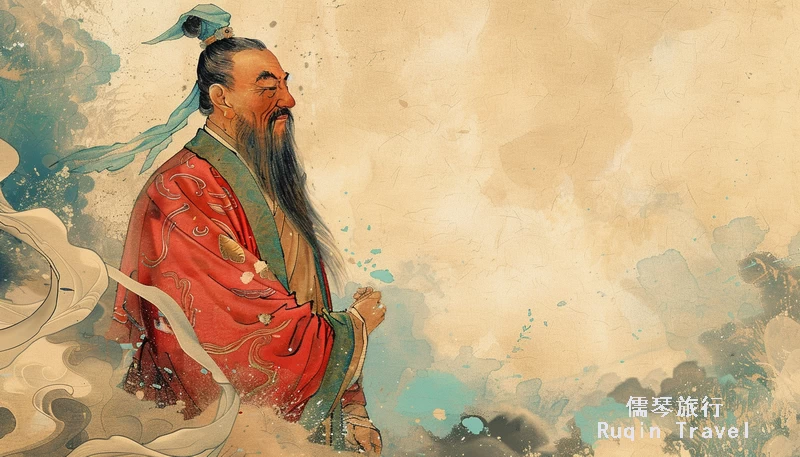
Confucius Philosophy – A Foreigner’s Guide to Confucianism
Confucius Philosophy is one of the most influential philosophies in Chinese history. When visiting China, it’s essential to understand the cultural and philosophical heritage that shapes the nation. Founded by Confucius , this philosophy has permeated Chinese society for centuries.
In this article, we’ll explore the core principles of Confucianism , its historical impact, and its relevance in modern China. By the end, you’ll have a deeper appreciation for the teachings of Confucius and their significance in Chinese culture.
Who Was Confucius?
Confucius, known as Kong Fuzi in Chinese, was a philosopher and educator who lived from 551 to 479 BCE. He was born in the state of Lu, in present-day Shandong Province.
Despite his humble beginnings, Confucius became one of China’s most revered thinkers. His ideas focused on morality, social relationships, and justice. As you explore China, you’ll often encounter references to Confucius and his teachings.
The Core Teachings of Confucius
At the heart of Confucianism are several key concepts. These include Ren (benevolence), Li (proper conduct), and Xiao (filial piety).
Ren emphasizes kindness and empathy towards others. Li refers to the importance of rituals and manners. Xiao stresses respect and care for one’s parents and ancestors. Together, these principles form the foundation of Confucian ethics .
Ren: The Essence of Humanity
Ren , often translated as “benevolence” or “humaneness,” is central to Confucian thought. It represents the ideal relationship between individuals, based on mutual respect and compassion.
Confucius believed that practicing Ren would lead to a harmonious society. For example, treating others with kindness and respect fosters positive relationships. As you travel through China, you’ll notice that this emphasis on respect and courtesy is still prevalent.
Xiao: Filial Piety
Xiao , or “filial piety,” underscores the importance of respecting one’s parents and ancestors. Confucius placed great importance on family relationships. He believed that harmony in the family would extend to society at large.
In modern China, the value of Xiao remains strong. You might see it in the care given to elders or the reverence for ancestral heritage. This respect for family ties is a vital aspect of Chinese culture.
The Analects of Confucius
The Analects is a collection of sayings and ideas attributed to Confucius and his disciples. This text is a primary source for understanding Confucian philosophy .
The Analects cover various topics, including governance, education, and personal conduct. By reading the Analects, you can gain direct insight into Confucius’s thoughts and teachings. Many quotes from the Analects are still relevant today, reflecting timeless wisdom.
Confucianism and Its Influence on Chinese Society
Confucius Philosophy has profoundly influenced Chinese society for over two millennia. It shaped the development of Chinese political systems, education, and social norms.
Confucius’s emphasis on moral integrity and ethical governance impacted how Chinese leaders ruled. Additionally, Confucianism’s focus on education led to the establishment of state-sponsored schools. As you explore China, you’ll see how these influences remain evident in contemporary practices.
Confucian Values in Modern China
Despite the modernization and rapid development, Confucian values still resonate in modern China. Concepts such as respect for authority, emphasis on education, and strong family bonds are deeply ingrained.
In workplaces, hierarchical structures often reflect Confucian principles. Similarly, educational success is highly valued, mirroring Confucius’s advocacy for lifelong learning. As a visitor, understanding these values can help you navigate social interactions more effectively.
Visiting Confucius Temples
China is home to many temples dedicated to Confucius , where you can explore his legacy. The most famous is the Confucius Temple in Qufu, his birthplace. This UNESCO World Heritage site includes the temple, cemetery, and family mansion.
Visiting these sites offers a glimpse into the historical and cultural significance of Confucius. Additionally, you’ll find Confucius temples in major cities like Beijing and Shanghai, each with unique features.
Confucius Philosophy for Visitors
As a visitor, appreciating Confucianism can enrich your experience in China. Understanding the philosophy helps you connect with the local culture on a deeper level.
For instance, practicing respect and courtesy aligns with Confucian values . Engaging in traditional rituals, such as bowing or offering gifts, can show your respect for local customs. By embracing these principles, you’ll find your interactions more meaningful and rewarding.
Confucius’s Influence on Chinese Education
Confucius emphasized the importance of education and self-cultivation. He believed that everyone should strive for personal and intellectual growth. This belief led to the establishment of a meritocratic system in ancient China, where civil service exams determined government positions.
Today, China’s educational system still reflects Confucian ideals. The rigorous focus on academics and respect for teachers are testament to Confucius’s lasting impact.
Confucian Ethics and Governance
Confucius advocated for ethical governance based on moral integrity. He believed that rulers should lead by example, embodying virtues such as honesty and compassion. This idea influenced the development of Chinese political philosophy.
Even today, the concept of a “virtuous leader” resonates in Chinese political thought. Understanding this can provide context for China’s historical and current governance structures.
Confucianism and Chinese Art
Confucianism also influenced Chinese art and literature. Many classical works reflect Confucian themes, such as respect for nature and the importance of moral values. Calligraphy, painting, and poetry often embody Confucian ideals.
Visiting art galleries and museums in China, you’ll see how these principles are woven into the fabric of artistic expression. This blend of philosophy and art enriches the cultural landscape of China.
Confucianism in Daily Life
Confucian principles permeate daily life in China. From family gatherings to business meetings, these values guide social conduct. Respect, humility, and harmony are central to interactions.
As a visitor, observing these practices can provide valuable insights into Chinese society. Whether dining with a local family or attending a festival, you’ll experience the practical application of Confucius Philosophy.
The Global Impact of Confucianism
Confucianism ‘s influence extends beyond China. Many East Asian countries, including Korea, Japan, and Vietnam, have integrated Confucian principles into their cultures. This shared philosophical heritage fosters a sense of regional identity.
As you travel in Asia, recognizing these commonalities can enhance your understanding of the broader cultural context. Additionally, Confucian ideas have found relevance in Western philosophical and ethical discussions.
Confucianism , with its rich history and profound impact, is a cornerstone of Chinese culture. Understanding the philosophy of Confucius offers valuable insights into China’s social norms, governance, and daily life.
As you explore the country, appreciating these principles will deepen your cultural experience. Embrace the wisdom of Confucius , and you’ll find your journey through China more enriching and meaningful. Check out China Cultural Insights for more information.
Post navigation
Previous post.

No comments yet. Why don’t you start the discussion?
Leave a Reply Cancel reply
Your email address will not be published. Required fields are marked *
Chinaeverywhere.com
China Travel Advice Cdc

China Travel Advice CDC
Travelling to China can be a daunting prospect. But with the right information and preparation, you can make your trip to the second largest country in the world a fun and fascinating experience.
China is a rapidly growing country, and with that growth comes plenty of opportunity for tourists, travelers, and expats. In order to take full advantage of what China has to offer though, keeping up with the latest China travel advice from the Centers for Disease Control (CDC) is essential.
The CDC offers several pieces of China travel advice, including tips on how to stay healthy during your travels. The most important pieces of advice to remember are:
- Drink only boiled or disinfected (treated) water, eat freshly prepared hot food, and avoid raw, uncooked foods.
- Avoid contact with animals, and follow proper hygiene techniques.
- Check out the latest health alerts concerning China, and the rest of the world, on the CDC’s website.
- Avoid contact with people who appear to be ill.
- Protect yourself from mosquito bites and other potential insect-borne diseases.
- Pay close attention to the local news and regulations, and abide by all local laws and customs.

These are just a few of the key safety points to consider when travelling to China. The CDC also offers important information regarding vaccinations, insurance, and travel documents.
For travellers heading to rural parts of China, the CDC has released a travel health alert for H7N9 – a strain of avian influenza that can be contracted from contact with poultry and other forms of livestock. Be sure to check with your doctor before heading abroad, and keep up to date with the latest health advice.
Additionally, all travellers should be vigilant by researching the local laws and customs before they visit a destination, as there are strict penalties for breaking them. It is also important to always exercise good judgment when dealing with sensitive issues such as religion, race, and politics.
Finally, the CDC advises all travellers to register with the Smart Traveller program before their journey, so that in case of any emergency, friends and family can be contacted easily. Remember, don’t leave home without the latest travel advice from the CDC.
Currency Exchange
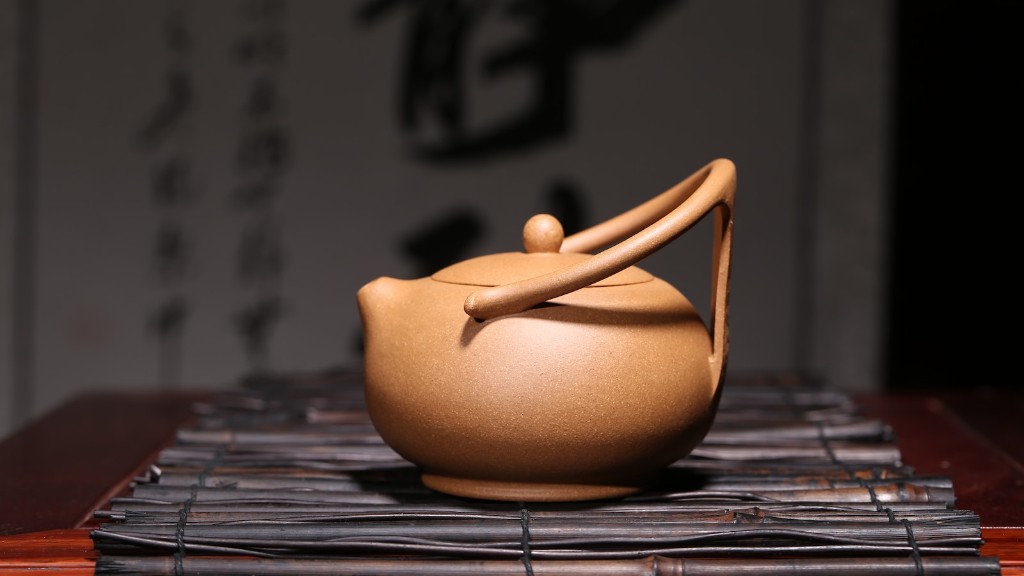
No matter where you go, in China or elsewhere, exchanging currency is a must. Before departing for China, it is important to be familiar with the exchange rate and what currency you should bring.
The most commonly accepted currency in China is the Chinese Yuan (or Renminbi). To help you make the most of your money, it is recommended that you check the exchange rates online before you leave. There are many reputable currency exchange services to choose from, such as Travelex, and it is important to ensure that the exchange rate is close to that of the official rate before exchanging.
If you are heading to some of China’s more remote or rural areas, it’s also a good idea to carry a small amount of local currency for small purchases. For larger transactions such as hotel bookings or shopping, it is advised that you use a debit or credit card.
Once in China, exchanging money is relatively easy, as there are plenty of banks and currency exchange outlets with extremely competitive rates. In major cities, there are even dedicated stand-alone currency exchange centers or kiosks where changing money is hassle-free.
Getting Around in China

Getting around in China is generally quite affordable and, depending on the season, may be significantly cheaper than traveling to other countries. China’s most popular methods of transport are plane, train, bus, and car.
Travel by plane is the quickest and most convenient way of getting around China, and prices can be quite reasonable. The country has many international and domestic airports, so you’ll be able to fly to almost any destination. However, keep in mind that tickets need to be purchased in advance for the best rates.
Trains are a great option for longer journeys and they are comfortable, safe, and reliable. The train network in China is extensive and very well-maintained, making it easy to find a route to almost any destination. Plus, buying tickets online is easy.
Finally, buses are the least expensive way to get around China. Most cities have large bus networks, and you can usually find a bus to take you where you need to go. However, it is important to double-check the timetable before setting out as buses may not always run on time.
Safety Concerns in China

Given its size, China is generally a safe destination for travelers. However, it is important to be aware of your surroundings and take the necessary precautions to ensure your safety. Pickpocketing, theft, and scamming are not uncommon in large cities, so it is important to stay vigilant and be aware of your belongings.
It is also imperative to check the local news and stay abreast of any potential safety concerns when travelling to China. In recent years, there have been several attacks around the country, and although the chances of being a victim are small, it pays to stay vigilant.
The best way to stay safe as a traveler in China is to stay in well-populated areas. When travelling alone, it is advisable to research routes and check in with your travel group regularly. Furthermore, it is wise to tell friends and family where you are travelling and what level of support they can provide in case of an emergency.
Tipping is not common in China, and in some cases it can be easily misinterpreted. However, giving a small “thank you” tip when receiving excellent service is sometimes appreciated. Additionally, foreigners usually do not need to pay a service fee for their meal.

In most cases of business dealings it is not customary to tip in China. However, small tips when dining in a restaurant, receiving a massage, or taking a taxi are not frowned upon. Generally, a 5-10% tip is seen as generous and polite.
When in doubt, simply ask. For example, when staying at a hotel, ask the front-desk if it is customary to tip. Remember, it is always polite to offer, but never to insist.
Useful Phrases
Knowing a few phrases in Chinese can go a long way. In many parts of the country, people speak English, but it’s always a good idea to be able to communicate the basics. Here are a few useful phrases:
- Nǐ hǎo – Hello
- Xiexie – Thank you
- Duō shao qián – How much does it cost?
- Wǒ bú huì shuō Zhōngwén – I can’t speak Chinese
- Zàijiàn – Goodbye
- Hěn gāoxìng rènshi nǐ – Nice to meet you
There is no doubt that planning for a trip to China can seem overwhelming. But armed with the latest China travel advice from the CDC, along with this article, you can rest assured that your travels will be a positive and secure experience. Bon voyage!

John Melendez
John J. Melendez is a journalist, author, and commentator specializing in Chinese culture, politics, and international relations. He is a frequent guest on radio and television programs, and is the author of several books on Chinese culture and politics. He currently resides in Beijing, China.
Leave a Comment Cancel reply
Travel Around China: The Guide to Exploring the Sites, the Cities, the Provinces, and More

Contact details

Votre librairie en ligne
Navigation Menu
Search code, repositories, users, issues, pull requests..., provide feedback.
We read every piece of feedback, and take your input very seriously.
Saved searches
Use saved searches to filter your results more quickly.
To see all available qualifiers, see our documentation .
- Notifications You must be signed in to change notification settings
Travel Tips for Foreigners to China
iHuahua/Travel-Tips-for-Foreigners-to-China
Folders and files, repository files navigation.
近期中国再次开放 144 小时过境免签政策,看到一些国外的朋友来中国旅游时遇到一些问题,故此想整理一些来中国旅游的小技巧,减少旅客不必要的麻烦,以提高旅游体验。
Recently, China has once again implemented the 144-hour visa-free transit policy. I've noticed that some foreign friends encounter issues when traveling to China, so I want to compile some travel tips to reduce unnecessary troubles and improve the travel experience.
内容为机器翻译,翻译可能有不当之处,还请谅解,如有小伙伴有兴趣一起维护该项目,特别是英语比较好的,欢迎加入一起弘扬中国文化。
The content is machine-translated and may contain inaccuracies, so please bear with us. If anyone is interested in helping to maintain this project, especially those proficient in English, you are welcome to join us in promoting Chinese culture.
特别声明:该项目仅提供一些建议,不涉及任何政治问题
Special Notice: This project only provides some suggestions and does not involve any political issues.
Network(网络)
由于一些法律因素, Google / Facebook / Twitter 等服务是无法使用的,即便你使用的是国外运营商的 SIM 卡,如果旅游期间你不得不使用它们,请提前准备 VPN ,网络问题也是很多外国旅客到中国之后猝不及防的问题,后面我介绍一些生活中常用的软件。另外,请提前准备互联网流量套餐,可以使用原来运营商的跨境流量包,也可以在当地营业厅使用护照购买流量卡,一般来说,更推荐前者,因为前者的条款更容易理解。
顺带提一下, Github 在中国部分地区也是无法访问的
我已经不记得上一次使用现金交易是多少年前了,在中国,除了过年的时候长辈给晚辈发红包使用现金,99.99%的生活场景是不需要现金的,上到一线大城市,下到十八线小村庄,基本都是支持电子支付的,所以,来中国旅游极力推荐使用电子支付,因为那没有现金被盗的风险,也没有硬币和零钱的烦恼。目前,中国最流行的电子支付方式有两种, 支付宝 和 微信支付 ,后面会介绍他们的区别。
注意:中国不是小费文化的国家,这意味着你不需要为商品之外的服务买单,包括服务业,你不需要给餐厅服务员小费。 另外,尽管中国的在线支付很发达,我还是建议备一些现金,不需要很多,三百或者五百人民币一般来说就足够了
Chinese Cuisine(美食)
中国有八大菜系,还有很多民间特色食物,这里就不具体展开了(主要是很多我也没有吃过),如果这个项目关注的人多了,我就花时间整理一下。这里提醒一下,在一些机场、火车站、景区里面或者附近的美食多数都是不太正宗的,而且卖得会比较贵,一般来说,想吃当地的美食,最快捷有效的办法是问当地人,例如:出租车司机。如果你完全不了解中国也不懂中文,那么建议你去吃饭人多的地方,因为吃饭人多的地方可能不是最好吃的,但也不会难吃
Popular Applications(流行应用)
Pay online(电子支付).
微信是中国使用人数最多的应用,没有之一,这是一款即时通讯的应用,前面提到的 微信支付 就是微信的一个功能,除了聊天和支付,微信还有小程序功能,它可以帮助你在餐厅中自助点餐(如果餐厅支持的话)等等,事实上绝大多数的二维码使用微信 扫一扫 都会有对应的功能出现(支付宝的二维码除外),强烈推荐, 下载地址
Alipay(支付宝)
支付宝一款电子支付应用,在很多国家都有它的身影,在发达的城市,它的普及率和微信支付是一样的,在偏远地区,微信支付普及率会更高一些, 下载地址
前面提到 Google 服务在中国是无法使用,其中就包括 Google Maps ,如果你有自己喜欢的应用可以继续使用它,也可以试试:
Baidu Map(百度地图)
他们都包含打车的功能,另外,还有一款打车APP,滴滴出行是专门打车的
Didi(滴滴出行):中国版 Uber
Translate(翻译)
前面提到 Google 服务在中国是无法使用,其中就包括 Google Translate ,如果你有自己喜欢的应用可以继续使用它,也可以试试:
腾讯翻译君:支持同声翻译
- 每个国家都有好人和坏人,中国也不例外,如果旅行期间遇到不愉快的事,我表示深深的歉意

IMAGES
VIDEO
COMMENTS
All international travelers should be fully vaccinated against measles with the measles-mumps-rubella (MMR) vaccine, including an early dose for infants 6-11 months, according to CDC's measles vaccination recommendations for international travel. Dogs infected with rabies are commonly found in China.
China, the world's most populous country (>1.4 billion people), is the fourth largest geographically, behind Russia, Canada, and the United States. Divided into 23 provinces, 5 autonomous regions, 4 municipalities, and 2 Special Administrative Regions ( Map 10-12 ), China is home to diverse customs, languages, and topographies.
More. Learn about CDC's Traveler Genomic Surveillance Program that detects new COVID-19 variants entering the country. Sign up to get travel notices, clinical updates, & healthy travel tips. CDC Travelers' Health Branch provides updated travel information, notices, and vaccine requirements to inform international travelers and provide ...
Reconsider travel due to a limited ability to provide emergency consular services.Exercise increased caution due to the arbitrary enforcement of local laws.. Summary: The U.S. government has a limited ability to provide emergency services to U.S. citizens in the Macau SAR due to People's Republic of China (PRC) Ministry of Foreign Affairs travel restrictions on U.S. diplomatic personnel.
The following vaccines are recommended to be current before traveling to China: Tetanus-diphtheria (DPT) Measles/Mumps/Rubella (MMR) Varicella (chickenpox) Hepatitis A is recommended for all travelers over 12 months of age to China. Typhoid is recommended especially if you'll be in rural areas where you may eat or drink outside large ...
Travel Advisory. China - Level 3: Reconsider Travel. Reissued with updates to COVID-19 information. Reconsider travel to the People's Republic of China (PRC), including the Hong Kong Special Administrative Region (SAR) and the Macau SAR, due to the surge in COVID-19 cases, arbitrary enforcement of local laws, and COVID-19-related restrictions.
Guide on Epidemic Prevention and Control Measures For China-bound Travelers. 2023-01-17 10:07. I. Pre-boarding Nucleic Acid Test. All China-bound travelers will need to take nucleic acid test for COVID-19 within 48 hours before boarding, and can only travel to China when your test result is negative or after it turns from positive to negative.
Train: The most usual way to get from Europe to China via train is to hop on the Trans-Siberian railway. The Trans-Siberian train is a lot easier to arrange when it comes to booking a ticket or organizing your visas. And it is significantly faster. The Trans-Siberian route, from Moscow - Beijing, is just one train.
Practical Tip: Travel by overnight trains or buses to save on accommodation costs and maximize your time exploring during the day. App Suggestion: Download the China Railways app for booking train tickets and checking schedules on-the-go. Use Didi Chuxing or Meituan Dianping for convenient and affordable ridesharing or taxi services within cities.
U.S. Travel Association President and CEO Geoff Freeman issued the following statement on news that the U.S. Centers for Disease Control and Prevention (CDC) plans to end mandatory COVID-19 tests for travelers from China to the United States: "We applaud the Biden administration for implementing a sensible policy and changing that policy as ...
There's a different side of Hong Kong for all different beats. We caught up with rising music artists at Live at the Big Top to share their Hong Kong hit list, like homegrown popstar Kiri T's favorite hood and Texan crooner Johnny Stimson's harbor hangout spot.
The fee for the first application from Hong Kong is $260, while the fee for renewal or replacement from mainland China is 230 RMB. A step-by-step guide to applying for the Non-Chinese Mainland ...
They can provide the latest travel information, unique attraction recommendations and authentic food guides. Through local travel agencies, tour guides or online travel communities [specific community or travel agency links], foreign tourists can obtain valuable advice and assistance to make their trip to China more memorable.
NPR world news, international art and culture, world business and financial markets, world economy, and global trends in health, science and technology. Subscribe to the World Story of the Day ...
July 2024 - Travel guide books - China Forum. Asia ; China ; China Travel Forum; Search. Browse all 147,830 China topics » July 2024 - Travel guide books Watch this Topic. ... Reply to: July 2024 - Travel guide books. Your message. Read our community guidelines. Get notified by e-mail when a reply is posted. Preview. China forums . China ...
2. Always carry hand sanitizer with you. This ties in with number 1. Washing your hands with only cold water, and no soap, doesn't kill all the germs. That's why I recommend carrying a small bottle of hand sanitizer along with your toilet tissue. 3. Pack the right way. Don't forget the essentials for China.
Chinese porcelain is a fascinating subject for many travelers. Known for its beauty, craftsmanship, and history, Chinese porcelain attracts tourists from around the world. This guide will take you through the essentials of Chinese porcelain, from its origins to its modern-day significance. The Origins of Chinese Porcelain
Confucius Philosophy is one of the most influential philosophies in Chinese history. When visiting China, it's essential to understand the cultural and philosophical heritage that shapes the nation. Founded by Confucius, this philosophy has permeated Chinese society for centuries.. In this article, we'll explore the core principles of Confucianism, its historical impact, and its relevance ...
China is a rapidly growing country, and with that growth comes plenty of opportunity for tourists, travelers, and expats. In order to take full advantage of what China has to offer though, keeping up with the latest China travel advice from the Centers for Disease Control (CDC) is essential.
The liberal harpies on ABC's The View are not happy with having to work so hard to defend President Biden in the face of persistent questions about his mental acuity and whether he is up to the task both as a sitting president and as the Democratic nominee, who would have to serve another four years should he win.. Cohost Joy Behar, a fellow octogenarian who's the same age as Biden, 81, is ...
Titre : Travel Around China: The Guide to Exploring the Sites, the Cities, the Provinces, and More Auteur : Blue Sky Publishing House Editeur : Collins Année : 2008 Théme : Loisirs, Nature & Voyages Sous-théme : Tourisme Voyages ISBN : 9780061473548 معلومات التواصل 32 3610 . Votre librairie en ligne ...
Travel Around China: The Guide to Exploring the Sites, the Cities, the Provinces, and More . 1500 DA Fixed price Appeler. Message. ID 25841783. Date 07/02/2021 14:47:17. Condition. Never used. Description Titre : Travel Around China: The Guide to Exploring the Sites, the Cities, the Provinces, and More Auteur : Blue Sky Publishing House Editeur ...
Travel Guide for Foreigners to China. Contribute to iHuahua/Travel-Guide-for-Foreigners-to-China development by creating an account on GitHub.
About this video:এই 2024 ভ্রমণ নির্দেশিকাটিতে চীনের অবিশ্বাস্য বরফ উৎসবের ...